#everything started from misunderstanding and lack of knowledge
Explore tagged Tumblr posts
Text
Reading a Ghost Story: Kim Soleum vs. Baek Saheon
there seems to be a consensus that there’s somebody "right" in this freak-off and it's KSE (the "right or wrong" argument starting all the way from what the "correct" solution to abyss transpo was, to just. [gestures] their current beef). i personally think "right or wrong" is a bad framework here. they're fundamentally just different kinds of ghost story readers-- not even in a "one misunderstands, one understands" way, they just aim to get different things out of the text. we see this again and again but it's particularly encapsulated in where the feud started: abyss transpo
KSE taunting BSH in the subway
strangely... there are a lot of different interpretations on what happened? so i'm going to say the interpretation i think is the most compliant with the text
KSE intends on making BSH regret assaulting someone out of the concern that only one lost item was eligible. whether this concern was justified is irrelevant. this is the rationale behind KSE showing BSH the disembodied female eye
off the bat, BSH misinterprets this. instead of feeling regret for assaulting someone, he regrets sacrificing his own eye when there was a perfectly disembodied one that KSE knew about. this is a false assumption, because the disembodied eye didn't fit the criteria
now: was BSH's original concern justified?
the announcement says, "There is a lost item. If you've found the lost item, please disembark at the next station and hand it over to the station staff." KSE makes his later remarks based on the nature of a "lost item"- and BSH uses that approach too! after a person loses their hat and gets it returned to them, do they want a second identical hat? a "lost item" is no longer lost when it is returned for the first time. BSH's original concern is justified
a lot of horror puzzles require a kind of leap of faith (ex. "the 75% chance must be true, and the 25% chance false). KSE knows that the metaphorical 75% is canonically true im DER- he is only certain that he can definitely get off later because he is a cheater with meta knowledge. BSH is unable to be certain and unwilling to take a leap of faith about his own survival, so he (rationally and ruthlessly) takes care of it
Their feud
famously, this difference in abyss transpo kickstarts their legendary freak-off
Viper from DER canon thrives in daydream. he's suited for ghost stories- reading them, and surviving them. and in abyss transpo, KSE finds out that BSH is fundamentally Viper
this is why KSE is so unnerved by him!!
some people seem to think BSH is "stopped from being Viper by KSE's mind games"? but that's not true. BSH never loses his instinct to always go for the coldly rational solution (as GSGW goes on, every time KSE appears to bare his neck, BSH goes for it. despite--and even because of-- how KSE is seen as a threat)
interestingly, BSH (who isn't afraid of ghost stories) is more single-minded about survival than KSE (who is a HUGE COWARD, yet finds the time to worry about others)
KSE's feud with BSH stems from that. if someone were doing everything BSH did out of panic, KSE wouldn't be nearly as on-guard. but BSH doesn't need cowardice to do what he does
As ghost story readers
KSE's position within GSGW is "a good reader- one who understands ghost stories." so with their feud, does this mean that BSH is a bad reader?
again, BSH thrives in daydream, and he's good at nailing what it takes to survive. BSH is an equally valid reader- he simply lacks the evolutionary pressure (KSE's fear) to become the kind of reader that KSE is
BSH's nature means he (can afford to) embrace the ghost story at face value
KSE's cowardice does not allow him to do this- he doesn't share BSH's resilience (and ruthlessness). naturally, KSE takes a lesser-walked perspective on the ghost story. one where he makes textual analysis leaps of logic
it's important to note how KSE's knowledge of previous escape records/DER plays a crucial role in his reasoning. as stated previously for abyss transpo, concluding that "people who got off at colored stations were likely not wearing those colors" etc can only be done through knowing about other escape records. and sure, BSH could've chosen to skip this blatant escape opportunity like the rest of them-- tried to use the deeper nature of what a "destination" is, like KSE did
... but BSH would never throw away a blatant escape opportunity for himself
again, KSE and BSH have different priorities when reading ghost stories: mainly, "empathy" vs. "self-preservation." despite being a coward, KSE loses the "self-preservation" olympics. he places as much emphasis on others as he does on himself in terms of escaping alive and well. maybe even more, when considering what he does at the bureau (Looky Mart). and this empathy extends to the actual ghost story! KSE's evolving relationship with Braun can take up an entire post by itself
meanwhile, BSH is willing to pay the price of taking ghost stories at face value- any blatant escape opportunity will do, he lacks the standards that KSE's empathy gives him. whatever gets him out and alive
BSH was born to survive ghost stories, KSE was born to manipulate them
*end note: this is tangential, but it's funny how a lot of people interpret all of this as KSE being a good person. i mean he does good things certainly. and he's a "better person" than BSH is. but... wow KSE's sense of morality can be its own post
#ghost story gotta work#kim soleum#baek saheon#gsgw#<- sigh i wanted to use this as my fandom tag but i got too far deep into#ghost story#<- being my tag
86 notes
·
View notes
Note
hello! for the valentines event, can i request a piece with isagi from blue lock?
the general idea is about childhood friends to lovers, with reader owning a coffeeshop and isagi being a pro player who visits the cafe quite often. since being kids, they were unseparable, until high school and the blue lock thing starting; then, both isagi and reader started noticing the subtle changes and how pretty/handsome the other is. after blue lock and isagi becoming the pro player, they couldn't see each other that often, so some angst and misunderstandings could fit in here, overall i ask for fluff!
if i messed up something or didn't explain properly please ask, i am currently losing my mind over him and am not thinking straight
(and hi! could we by any chance become moots? you seem really cool and making friends here is hard >.<)
🌑Of course honey!! Nearly had a heart attack thinking Tumblr deleted this request but it just didn't show up on desktop for some fucking reason 🙃
Anyway here it is i'm quite proud of it. Also since i got a job I've been focused on adjusting so i've been writing slowly but it's picking up! :)

𝓘 𝓶𝓲𝓼𝓼 𝔂𝓸𝓾, 𝓬𝓸𝓶𝓮 𝓱𝓮𝓻𝓮!
Isagi’s shoulders ache, so do his thighs and his feet and just about everything else. But such is the life of a professional football player – even when there’s no official game, training always succeeds in kicking his ass.
Although, the sight of your face at the end of a long day whenever he had the time to visit always serves to make it all more bearable, like a reward.
You’re buzzing around behind the counter like a busy bee when he arrives, despite the lack of customers currently ordering – seems like closing hours might be especially busy for the sole worker for the day, who also happens to own the store.
Watching you from afar helps to settle his nerves slightly, but only slightly. You're no longer kids, and that knowledge weighs on him through every interaction – feeling as if he’s both too stiff and overstepping all at once somehow.
Little does he and his usually abnormally observant eyes know, you're having the same problem. Everytime you catch a glimpse of him outside the shop window, you take an instinctive moment to make sure you don't look too frazzled – an automatic action that greatly confused you at first. Why do you care if he sees you like that? Every other customer does.
But he’s not every other customer, obviously, even before you grew apart and the distance someone made your heart grow fonder, he’s always been special to you – just in a different way.
The one who never laughed at your little coffee shop dream, the one whose immense determination in his own dream you always admired – Isagi Yoichi, then best friend, now pro-player whom you barely get to see nowadays.
The bell above the door rings as it opens, a head of dark hair coming though and a pair of blue eyes locking with yours immediately upon entry. You exchange tight-lipped smiles as you put the finishing touches on his usual order, before he’s had the chance to order it.
As you work, you covertly (or so you think) observe him as he moves closer to the counter… before being cut off by some girl excitedly dashing up to him to ask for a picture. Fine, that's fine, totally normal for a decently world-famous athlete, no reason to make it weird… Except for the swirling ugliness in the pit of your stomach – twisting, writhing like some creature from the depths, aching to grab that girl by the shoulders and–
And nothing, because anything else would be stupid and silly. Pulling a girl's pigtails for trying to steal Isagi’s first kiss may have been somewhat acceptable in kindergarten, but no longer.
So you do what is acceptable; side eyeing them both as you finish up the orders you've taken.
“Hey–” you nearly slam the plastic cup in front of your childhood friend (once that girl is pulled away by her friend), thankful for the lid or else it would've sloshed all over his shirt. “Thanks… how'd you–”
“You've asked for the same thing since before Blue Lock and every time you try something different you never like it so, it's not too hard to guess what your order would be.” He still blinks at you as if you've said something utterly bizarre. You shake it in his direction to indicate he should take it and he does.
“When do you get off work?” he says it so quietly you nearly ask him to repeat himself, “5 o'clock.” He nods, hands fiddling with the straps of his backpack nervously – strange, he's never been one to fidget.
As the day winds down too many customers start coming in for you to linger on what he could possibly be nervous about.
You keep an eye on the corner he settles in as you work, alone during the afternoon rush as you are any other, though this one seems a bit busier for some reason… and there's a lot more pink?
No time – not for wondering if you've forgotten something important or to think about how the light catches on Isagi's blue hair as he sips his drink, casting glances towards you and locking gazes every time you do the same – no, no time for that.
You've nearly forgotten all about Isagi once the late afternoon rush has passed, the back of your neck sticky from the harsh lighting and feet throbbing slightly. Wiping down the counter as the last of your patrons filter out slowly, a shadow comes over you, blocking what little sunlight still lingers, “So, uhm, wanna walk home together? You know, like before?”
It almost sounds like he was going to say something else with how he trips over his words but you’re too tired to push, “Sure. Let me just close up.”
Isagi continuously shuffles from one foot to the other as you check over everything before locking up, fiddling with the straps on his duffle bag while waiting for you. You can just about catch him reaching into it once before taking his hand away, changing his mind. His face is still beet red.
“Ready?” You ask him, already starting to walk away from the building.
“Wait! Just… one thing.”
You turn back to him upon hearing his words and taking note of the shakiness of his voice, to see him with darting eyes and hands behind his back, looking like his heart might just run out of his chest from the nervousness.
As you stare at him expectantly, Isagi finally remembers what he’s supposed to be doing, puffing out his chest in an attempt to steel himself. You’re damn near holding your breath by the time he decides to move again, pulling the mysterious object from behind his back to reveal…
“Flowers…?”
“Y-Yeah, since it’s Valentine's I thought–”
“It’s Valentine’s?” The boy you once knew, now a man, looks at you like he once used to whenever you would steal his football and make him chase you down in order to finally play with him – exasperated and silently praying you aren't serious. “I mean, I kinda knew that I just… kinda sorta forgot until now.”
Isagi heaves a deep sigh, ending in a defeated sort of chuckle, he raises the beautiful, custom bouquet of all kinds of flowers (seemingly as to cover as many bases as possible since he likely doesn't know what flowers you’d like) towards you. You take it gingerly from his hands, waiting patiently for what he has to say.
“I think I’ve always loved you. In some way. I just never realized it, until now. At some point during Blue Lock I started feeling like something was missing– no, like something was taken from me. And it wasn't just my phone and… everything else they took – it was you. Every time I felt discouraged I wished you were there to cheer me up like you always used to do when we were kids. At some point that ache became its own motivation, thinking that you’d tell me how proud you were if I won.”
“Listen, I wrote a whole speech, but it doesn't feel right anymore. I love you. I don't know if you feel the same but I just– I just needed to tell you.” The sound of crinkling paper sounds between you, seemingly echoing as you clench and unclench your grip around the sheets enveloping the array of beautiful flowers in your hands.
You think to yourself that there's nothing you could possibly say to that that would even come close matching it in how raw that confession was. So you surge forward to kiss him, clutching the flowers to your chest in order to not drop them.
The kiss is light, full of hesitation and restraint, but earnest, made of love that’s been brewing for years and is now finally realized, “I love you too. And I think that speech was perfect.”
Isagi chuckles, releasing all the tension in his broad shoulders all at once, and though he looks like all he wants to do is kiss you again, he speaks instead, “That’s all I needed to hear.”
#❣️event#blue lock#blue lock x reader#blue lock x you#blue lock x y/n#blue lock x gender neutral reader#bllk#bllk x reader#bllk x you#bllk x y/n#bllk x gender neutral reader#isagi yoichi#bllk isagi#blue lock isagi#isagi x reader#isagi x you
38 notes
·
View notes
Text
Hong Lu, An Analysis-Prediction
Before beginning, as always, I've to clarify something: I haven't read Dream of the Red Chamber. My best source of information are the thematic connections drawn in the Reddit sub of Limbus, and that only gives me a slight idea of what Project Moon may have in mind.
So, everything below here is complete and utter speculation based on my own knowledge and impressions about Hong Lu's character, Sins, EGOS, and Abnormalities. Beware, and feel free to comment your own opinions!
Now, let's go with the post!
What We Know
So, I think the best way to start this analysis is by recapitulating Hong Lu’s overall character so far. For that, we need to return to the first ever explanation of his personality: the “resume” given in the game page and during his presentation in Selva Oscura.
“As such, he has a certain admiration for a free life; but occasionally, he may make ignorant and unsavory questions in regards to the food cooked by a certain other Sinner or other aspects of the low-lives' lowly culture. [,,,] However, it is important to note that no sarcastic undertones are contained in his curiosity-driven inquiries, so it is ill-advised to let them get physical over it.”
As a general thing… It surprisingly holds up! Don’t misunderstand me, though. It isn’t that the description is perfect; it’s just not untrue. In fact, his first even line in the game, about Dante’s head being some sort of trend and not waiting for an answer, totally falls there. Similarly, there are several other moments showing Hong Lu’s innocence and naivety without any ulterior or hidden motive, from wondering if the casino workers of Canto II were trying to make the Peccatula their pets (likely because his grandmother collects weird animals) to unintentionally insulting Outis’ watch in Canto VI. I’d say the biggest proof of his lack of experience is the moment in Canto V where he adjusted the LCCB badge of a pirate that very obviously wasn’t a member of Limbus. Though all of his weirdness may derive from the fact that his elders—which are weird as hell—are his point of reference.
Now, since his most notable trait has been explained, we can move into the discrepancies of the description, and the biggest one is mentioned at the end: that under Hong Lu's comments there is no sarcasm—which is a complete lie! This man is a menace, and the Sinner’s experiences in District 20 during To Claim Their Bones and Canto VI shows it, from agreeing with Caiman’s assessment of LCB to joining Nelly’s teasing, including his lines while helping Heathcliff with his appearance and clothes. But arguably, my favorite example of this is the horror story he told during Canto V that scared Sinclair and which he only finished when the latter ran away. Don't tell me Hong Lu was being innocently insensitive back there: Sinclair was visibly shitting bricks, and the pretty boy here is keen enough to masterfully play the most compassionate and kind member of the League of Nine.
“Brother Young-ji was a man of kindness. He was not one to rashly harbor spite or reproach for others. You resemble him in that sense.” - Yi Sang, Blossoming League of Nine Littérateurs, Canto IV.
Though I suppose the difference between them is that Hong Lu clearly has a more optimistic and fun-loving attitude. This is an obvious trait that he has had since his childhood, when he played with and complained about his “cheating” siblings, sneaked into the dining hall of his manor for snacks, and simply didn’t follow his family’s rules. But since we know his family is extremely strict (if not outright sadistic), this sanguine streak may have developed (or gotten worse) as some sort of defense mechanism, which is seen better with Wakashu Hong Lu and his “lack of manners.” In fact, all of his Identities show an unnatural or improper calmness about his situation, no matter how horrible it is.
Another thing to highlight is his inquisitive, curious, and surprisingly understanding nature. While most of the examples above, especially him playing Young-ji, are proof of that, as it plays very well with his sheltered life. But I want to point out the best and most recent example of Hong Lu’s surprising contemplativeness: Time Killing Time. In particular, the most important scene is near the end, when Rodya and Hong Lu discuss his motivation to pursue the Time Reaper:
“I... just wanted to understand. Because, to me, the world was full of things I couldn't understand. In truth, I still understand so little of it. Why do people hang on so desperately to something like time? Something so... ephemeral?” - Hong Lu, Chapter 15: The Final Problem.
It’s normal to assume Hong Lu’s words are solely referring to the miserable monetary system of T Corp., but I don't think that’s all. We know that Hong Lu and Xinchun are well acquainted with the “immortality of the mind” the elders of their family are obsessed with, and what is immortality but infinite time? Thus, what Hong Lu asked there was why people hang on to the erroneous belief that life should not move or change, remaining constant and hence perfect for the rest of eternity. Yet, that isn’t what life truly is, right? It’s not for nothing that Hong Lu’s introductory quote is that “life has its vicissitudes as jade has its flaws,” which conveys his philosophy of detachment perfectly.
“When you’re distraught, simply remember that life goes on even if what you’re doing now doesn’t work out. Then, you’ll be free of worries.” - LCB Hong Lu
However, while the idea of detaching oneself from the whole without renouncing loving it is respectable, the way in which Hong Lu lives it is far from perfect, because detachment is not about carefreely admitting you will just simply gather the remains of your sister in case she is mutilated or readily accepting a horrible death just because you don’t mind dying. Even he himself admits from time to time, as with his jealousy over Heathcliff’s propensity to “ignore what he doesn’t like” (Rooms Past the Door) or Rim’s capacity to fly freely. In fact, one may even say that he hasn’t become detached at all, because doing so implies the complete acceptance of the “jade’s” beauty and flaws; Hong Lu, however…
“A thousand hours… Will a thousand hours have passed in the blink of an eye? [...] Then... I like that. Rip my time away.” - Hong Lu, Chapter 14: The Clock Tower of Fear, TimeKilling Time.
He has become detached from life altogether, and how could he not with the disaster that his family is? That likely was his only way to survive in such an environment, and unlike the rest of the Jia, he doesn’t seem to have that lucky predisposition for resentment and hatred. Even when his siblings tried to kill him the first time, Hong Lu didn’t come to hate them; he fully understood them because that’s the kind of person he is, just like Young-ji. However, since he realized such a thing through his big heart, he’s now fully aware that he will ultimately and cruelly die by their hands thanks to his love. In such a case, what other option does he have beyond merely “dancing”? A joke here, a sarcastic comment there, and a final appreciation for everyone so nothing is taken seriously and causes dissatisfaction, no matter how dim his eye becomes.
So, as of the 5th Walpurgisnacht, Hong Lu’s character can be summarized as follows:
Has a friendly, compassionate, and understanding personality that clashes against the violent and strict nature of his family.
Became detached over his own life because he can’t bring himself to hate and hurt his family.
His carefree attitude and sheltered life lead him to not understand some of the social conventions of… anyone who still has some respect for their own life.
Has a certain sarcastic and teasing streak, likely originating from both his personality and ideology.
There’s 1 aspect remaining that I didn’t mention above because I think it’s better to analyze Hong Lu’s EGOs first, to see what else we can rescue before giving a sort of “conclusion.”
About EGOs
Before any of you ask, no, I will not analyze Land of Illusion here; it’s best reserved for the next section, about Hong Lu Base ID. Instead, the first EGO I’ll deal with is, fittingly, the first one he ever received: Roseate Desire.
Roseate Desire originates from Pink Shoes, an Abnormality that evidently is an Aberration of Lobotomy Corp.’s Red Shoes, with their shared meaning being that of a single-minded and very violent obsession that’s impossible to resist—one of the purest expressions of Lust. But while Red Shoes and its EGO are fundamentally egoistic, not wanting to share the glory and pleasure of their desire’s fulfillment, Pink Shoes and Roseate Desire are of a softer shade, spreading their overwhelming lust to as many people as possible. The difference becomes clearer when you compare Rodya’s and Ishmael’s respective obsessions: the longing to be special vs. the desire to kill the “source of all evil” in retribution for all she has done.
Applying the former logic to Hong Lu, we can conclude first that he has a desire as strong as Ishmael’s hatred for Ahab, which is quite unexpected for someone who has basically given up on life! Thankfully, the Sin resources his version of Roseate Desire costs tell us a couple of things about his “fixation”: 4 Lust and 2 Envy. The dominance of Lust is self-explanatory, so that leaves us with Envy, which I commented on in the previous section: jealousy over those who can ignore and escape their problems—those who are “free.” Yet, since Roseate Desire and Pink Shoes are characterized by a sort of collective hedonism, so is Hong Lu’s wish to escape his family. Surely such a thing will bring joy to his cut-throat siblings.
And speaking about escapism, Hong Lu’s next two EGOs are all about that, beginning with the one whose Abnormality I analyzed in one of my previous posts: Dimension Shredder.
While Wayward Passenger is an Abnormality that is clearly about the trauma inflicted by W Corp.’s method of operation, it has a secondary meaning that Project Moon uses for its EGO too: being trapped in a horrible duty, necessity, or “path” that makes the individual envious of the life and possibilities others hold. This is best seen with Outis’ Dimension Shredder due to the Envy affinity, though Hong Lu’s Pride version isn’t that far off thanks to the Sin costs: 3 Pride and 3 Gluttony. Basically, it means that Hong Lu is “lost” due to external necessity, by things he can’t control (i.e., his family), but instead of resenting it as any other person would do, he takes pride in that, in having to follow a “terrible path,” because that’s the type of person he knows he is—the kind and understanding one that sacrifices himself.
The second EGO about escapism originates from LobCorp and hence from an Abnormality I haven’t analyzed: Soda and Opened Can of WellCheers, respectively. The two come from a Korean urban legend about people being drugged through juice cans and sold to fishing boats as slaves. Needless to say, the parallels with Hong Lu’s Soda are more than obvious: an envy born from a necessity (Gluttony) that grimly (Gloom) pushed him into a role he doesn’t want. Alternatively, and considering the ending of the Abnormality’s story log in LC, it’s the fulfillment of a fantasy born of jealousy, sadness, and necessity, though that doesn’t explain the Envy affinity of the EGO. Either way, nobody can deny that Soda stands for Hong Lu’s “murdered” wish to flee his circumstances.
The next EGO luckily is from another Abnormality I analyzed some time ago: Ambling Pearl and Effervescent Corrosion. However, unlike Rodya, who keeps the Abnormality’s original meaning mostly intact (safekeeping the “pearl”/one’s meaning from the “filthy” outside), Hong Lu gives it a twist: it’s not about protecting his “life treasure,” but something else
“Faust: For instance, let’s say that Hong Lu held a belief he was certain would be an unchanging constant as he lived in the City. Or, it could be a hope for some other psychological sustainment that has supported his life. Hong Lu: …Hmm. Faust: If that support suddenly collapses in a massively shocking event that causes one to let their “ego” go, his mind would crumble, so to speak. Hong Lu: …Well, I could see that happening. [...] Hong Lu: Hm… I thought I knew, but I can’t seem to elaborate on it with words right now.” - Chapter 3: Hell’s Chicken, Hell’s Chicken.
Unlike Rodya’s desire to be special and her notorious inner conflict, which is reflected in how similar her Corrosion is to a broken Ambling Pearl, Hong Lu is much more secretive about his opinions, usually referring to his frivolous comments instead of using the great insight he has, according to Dante. Nonetheless, even if we don’t exactly know the “core belief” he holds close to his heart (though we should have a general idea at this point), we do know that his version of Effervescent Corrosion, beyond Gluttony or the desire to survive, requires Gloom. So whatever Hong Lu is hiding, it’s far from happy, as his Sin weaknesses further show after EGO usage: weak to Lust and Sloth, to love and inaction—to the idea of not protecting himself.
In a similar vein, Hong Lu’s next EGO is entirely about sadness, as it comes from Blubbering Toad, aka depression incarnated. However, Cavernous Wailing isn’t a Gloom EGO but a Sloth one, and whose Sin costs are Gloom, Sloth, and Pride. That’s to say, Hong Lu’s refusal to take action and the resulting self-pity (“A heart shaken by sorrow bursts… like this.”) are fed by his sadness, indolence, and distorted self-perception, an aggrandized mental image of himself as able to carry all his pain without problem.
“It goes like this. Any of our siblings who managed to survive on their own up to the age of thirteen in our household will probably be a-okay even if they were to be tossed out to the middle of the Outskirts! Hehe…” - Hong Lu, Chapter 20, Canto VII.
Finally, the last EGO is the newly added Lasso, which comes from Rose Hunter, and really, its Mirror Dungeon Encounter puts it the best: Rose Hunter is the one who makes sure all stories follow their natural course, their flow, and “he” is no exception; the Hunter is willing to get lost if that’s the story it must obey. Fittingly, Lasso represents the same idea of not resisting one’s “tale” or “myth,” going along with what’s written not out of indolence or apathy, but because it’s necessary, akin to the motif of the “fetters of fate,” for example. In that regard, their underlying archetype is the same as that of the Orphic Ananke, the deification of the necessity that created the universe, which can be best understood through the following aphorism: existence came to be because it exists. Or put it in a simpler manner: you must follow your nature because that’s who you are.
Hong Lu’s Lasso, in the same way as Faust’s, requires first and foremost Gluttony to work, for that’s the entire deal of the Abnormality. Then comes the Lust requirement, which implies this “work” is also done out of either love or a twisted desire, a mania for things to follow their assigned nature or role. The final Sin cost is the variable one, which for Hong Lu is Pride again, his aggrandized sense of self that drives him to fulfill his role without complaining, solely out of love and necessity.
So, with all the EGOs analyzed, we can rescue the following:
Hong Lu, more than anything, wishes to escape the situation he has been put in. He wants to be free behind all those frivolous and/or insensitive commentaries.
However, due to his upbringing, he “murdered” those wishes so to speak, and remains walking the path his family has put him by many reasons, chief among them his love for them and his distorted perception of his own self.
Thus, all that longing and yearning for freedom remains hidden, barely able to see the light of the day except in the rarest of occasions. That’s likely his “pearl,” the thing that he ultimately hides for his own survival.
About His Base ID and EGO
You know, I have always been curious about why people are so adamant about Hong Lu being depressed. No doubt he has depression at some level, but I don’t think it’s as severe as people normally think it is because his Base ID simply lacks any form of Gloom. This is in stark contrast to Sinners such as Yi Sang, Gregor, and especially Ishmael, since she has a Gloom Base EGO as well. But if such is the case, then what does Land of Illusion means, since it requires Gloom to be used?
However, I think it’s important to understand Hong Lu’s Sin spread first, his psychology in this particular possibility:
His third skill, that is, his most inward and deep trait, is Lust. This Sin placement is only shared with LCB Heathcliff, whose devotion to Catherine is quite literally a multiversal constant as per Canto VI; everything he does, he does it for Cathy. Thus, Hong Lu must have a similarly romantic or affectionate nature, and we know that he isn’t the type to stop “loving” due to the cruelty of a person; his reaction towards the attempt against his life says enough. He even tried to understand the Time Ripper at some level during TimeKilling Time.
His second skill is Sloth, an inaction that’s much shallower but no less decisive, so to speak. One can understand it as deriving from his much more encompassing Lust or Love, which is to say that Hong Lu refuses to take action or initiative in his life out of love and understanding, in a similar manner to how LCB Faust lets her every move be commanded by the Gesellschaft thanks to her need for self-realization.
Finally, his third skill, his most outward and shallow trait, is Pride. This position is only shared with the Base IDs of Faust (again) and Sinclair, although the former is the easiest one to understand: Faust is somewhat haughty without a doubt, but not egocentric or self-absorbed by any metric; she’s just socially naive and with a great deal of knowledge that tends to ostracize her by her own volition. Pride is, after all, the de facto Sin of distorted self-perception, of thinking you are more capable than you really are.
Again, all of this tells us what we already know: the kindness of Hong Lu, his indolence born out of said kindness, and the weight he alone bears on his shoulders. We can’t even say that he has a low self-esteem unless we include in that definition a “imposing limits on who you are,” which, yes, sounds right, but it leans too much in the territory of semantics for my taste. Furthermore, Hong Lu’s strange relationship with Gloom and sadness can also be contrasted with the Sinners I mentioned before, those with Gloom and whose Cantos are available:
Yi Sang was the living stereotype of the depressed person: cold, distant, unfeeling, dead inside, etc. Whatever you name, Yi Sang likely had it.
Ishamel’s emptiness and self-destructivity were well-hidden until her Canto, during which all hell was let loose.
And Gregor is possibly one of the most realistic approaches of all, as we can see with the flashbacks of his past during Canto I. Even so, he… well, remains somewhat functional (and I’m really stretching the definition there xD)
And don’t get confused. In this case, Gloom isn’t equal to feeling sad or being traumatized by any means; every Sinner has their own share of problems, and not all have Gloom. Sinclair had his family and town massacred thanks to Kromer's obsession with him, for example, and while I don’t doubt he feels a deep sadness and regret about it, he doesn’t have Gloom in his Base ID. The same applies to Rodya, her low self-worth, and her guilt about the fate of her neighbors, lacking any sort of Gloom as well. The most extreme and recent case of this is boss Sancho, who doesn’t have any Gloom skill at all, despite her character and story being more than fitting.
Therefore, Gloom, in the straightest sense and avoiding exceptions or little quips, refers to a deep-seated hopelessness, a melancholy that devours all dreams and hopes, causing one to become completely lost in life. In such a case then, it’s not that Hong Lu isn’t sad or, damn, depressed, but that he knows how to manage such emotions so they don’t overwhelm him as they do with Gregor, Yi Sang, or Ishmael. The same likely happens with his wish to escape and his jealousy, for he seemingly knows that no life is truly a “flawless jade.”
“In a way, we’re all ‘deprived’... and that can change a lot of things. Maybe there are things that we can understand only when we’re left with nothing.” - Hong Lu, Chapter 1: Wuthering Heights, Canto VI.
This self-control naturally falls in line with his inclination for Pride and Lust, creating a sort of “transpersonal” point of view that allows him to curb his emotions in order to understand others. It’s quite Buddhist or Taoist, no? This kind of detachment over life I explained before, I mean. In a way, it strengthens the theory of Jia family elders treating Hong Lu as a golden child, and while he doesn’t seem to really like the idea, he resigned himself to it.
“I can't do much about what I was born with~ To them... I was a gem of a child.” - Hong Lu, Liu Association South Section 5 Uptie Story.
He renounced all the transient things in his life, all of his wishes and sadness, in order to carry out his family’s expectations: the preferred family head candidate. And what is another form to call transient things? Illusions.
Land of Illusion is the culmination of Hong Lu’s hidden sadness, his yearning to escape that will forever remain out of his reach—or at least he thinks so.
“With this there is often, to a smaller or greater extent, a savior complex, or a Messiah complex, with the secret thought that one day one will be able to save the world; the last word in philosophy, or religion, or politics, or art, or something else, will be found.” - Marie-Louise von Franz, The Problem of the Puer Aeternus.
Hong Lu doesn’t believe himself to be a savior, naturally. But I cannot deny that it would be very much in character for him to imagine or fantasize about a world where he doesn’t have to fulfill his family expectations, where they can all be happy. That would explain the Lust cost of Land of Illusions, as well as the weaknesses to Envy and Wrath, which are a stand-in for the rejection of his innermost wish.
But alas, at the end, life has its flaws, and there’s no way Hong Lu will raise a fist against his family. Even if his survival depends on it, Hong Lu won’t defend himself because that would mean choosing and thus losing, and there’s nothing more terrifying to the eternal child than losing things. Death is a much more merciful and tempting possibility than acting and suffering.
“The puer aeternus very often has this mature, detached attitude toward life, which is normal for old people but which he acquires prematurely—the idea that life is not everything, that the other side is valid too, that life is only part of the whole existence. [...] So before he has gone down to earth, he already has the offer of death.” - The Problem of the Puer Aeternus.
In this regard, it doesn’t matter much Dante’s rewind or the actual existence of an afterlife. It’s the idea of death as a solution for a hard life, instead of confronting the problem itself, of standing up and withstand the uncertainty and pain of life.
AAt the end of his Canto, Hong Lu will have to stand up for himself and to carry on the pain. That's how a "child" becomes an "adult," or better said, an actual family head.
Post-Commentary
... Yeah.
To be honest, I don't know where the inspiration behind came for this. It just fell on me one day, like Faust's theory. But where I'm confident in that one, I'm completely lost in this post, especially because while the conclusion seems right (standing up to the abuse and expectations coming from one's family), the reasoning is somewhat flimsy? I don't know. I have the feeling that I'm retreating Canto VII's (and even Canto III's) story and themes somehow, though the similarities may be the reason of why Xinchun was introduced, maybe. That would make Don's confusion funnier xD
The final mentions of the puer aeternus (similar to the Peter Pan syndrome, but not quite) are due to how Hong Lu's character screamed "puer" to me, surpassing every other one. The fact his summary highlighted that he is a "bachelor" brought to mind this little quote of Marie-Louise's books:
“The two typical disturbances of a man wh ohas an outstanding mother complex are, as Jung points out, homosexuality and Don Juanism.”
If a man gets around too frequently, he'll obviously not get married. If he's gay, then even less reason to do so or look at women. In this case, the idea is not about the actual sexual orientation of Hong Lu (or the accuracy of the book's assessment), and more about highlighting his refusal to commit.
Also, as a funny note, The Problem of the Puer Aeternus has a fragment that's really similar to, from what I've gathered, the warnings the monks gave to the Stone at the beginning. Since the book also deals with the case of Saint-Exupéry and The Little Prince, there may also be something interesting regarding Demian (Limbus', not Hesse's).
Anyway, and repeating myself, if you have any other opinion or thought you want to share, feel free to do so! Similarly, if you notice any orthographical or grammatical error, let me know. It's difficult to see them, even when using several online tools...
#limbus company#hong lu#canto 7 spoilers#canto vii spoilers#canto viii speculations#canto 8 speculations#limbus company theory
34 notes
·
View notes
Text
A Much Needed Overview
I’ve been brought to a point of feeling the need to discuss the abuse depicted in Bungou Stray Dogs. This isn’t the brightest topic to speak about and I understand why people are reluctant to speak in detail about something as serious as this. It’s not easy, so I’ll be the brave face today because I feel disappointed about the lack of deep discussion beyond the popular topic of “The Abuse Cycle”.
I’m happy that it’s at least brought up amongst everyone as something that exists, I’m happy that people feel as though it’s something to talk about, but I don’t think most understand how to act about it. It’s never as cut and dry as how it’s depicted in most other pieces of media or how people speak about it in general. That is why I am thankful for its depiction here. Not saying that nobody speaks about it with clarity, but it’s not the majority, unfortunately.
I especially felt this was a good time to address this because of the reaction towards Asagiri’s thoughts on Dazai and Akutagawa’s relationship in the recent magazine interview. The outrage is not from nowhere, I was also taken aback at first, but to claim Asagiri “doesn’t even know his own story” is incredibly self-entitled considering the story isn’t done, nor are you the one writing this. If you read the story, no way is Asagiri justifying anything that happened. Please look at the question that is being asked, does it say “Do you think what Dazai did is morally right?” Of course, it isn’t.
Not to be rude but before you start questioning the writer himself if he’s read his own story, have you read it? Please keep in mind the fact this is only a magazine interview and doesn't reflect every nuance. Asagiri doesn't need to go “Oh yeah, this thing that’s bad is bad” every two seconds to explain himself. Asagiri’s writing decisions can be questionable and cannot be uncritiqued, but I’m going to have to defend him on this account.
I’m not sure if any warnings are needed concerning the subject matter considering most BSD fans know what I’m about to go over, but to be clear, please only read this when you’re in a well enough headspace for heavy matters such as this. I am not going to be talking lightly in any of this or dance around what’s happened between any of the characters, abuse is harder to talk about compared to other acts of violence that are objectively worse because it’s a more personal act that too many can find themselves in.
Finally, I do not want to speak about my own experiences online because I’ve only come to terms recently with it and they do not reflect everyone’s response to depictions of abuse in all media. Some things are very uncomfortable to admit about me that I haven’t told anyone, that no one would be able to take well even if they were my closest friend. This isn’t about me at all and there is no point in saying more about my reality, but I think my perspective might help people enlighten themselves on how truly complicated situations like this are.
What is Abuse?
Surprise, we need to go over this before any discussion about BSD happens because a lot misunderstand what abuse is. It's disheartening that the term has been so simplified that nobody knows what it means anymore. Don't substitute words for abuse or use abuse as a substitute for other terms. Abuse as a concept is quite hard to pin down with words and there are many ways to describe it, but by definition in the context that it’s directed to another person, abuse is:
To target and mistreat someone, causing them harm or distress in a repetitive manner
This by itself does not describe the grand scope of everything and probably might make you more confused, but it’s a great place to start and does describe what is directed to the victim. Many sources will use varied wording, but it’s the general knowledge that someone is being hurt to a fundamental level that makes it abuse.
Does the abuser need to intentionally hurt someone for it to be abused? Yes, but not in the way you think. Most abusers are not hurting their victims for the sake of just hurting them, that’s illogical, they’re doing it for something. Some examples include either for themselves in some way or what they think is for their victim’s “own benefit”. Even worse is when they genuinely believe it because they’ve also grown up in an environment that has that same mentality and reflects on themselves.
So yes, it’s intentional in that they’re doing it for a purpose. No matter their intention though, “selfless” or not, it’s still a selfish act in itself that they think that imposing their own will through harmful methods is what the victim needs. The abuse doesn’t need to be physically harming another for it to be abuse. As long as it’s harming you emotionally or otherwise and making you raise flags in your head, it’s abuse.
It sounds strange, but I'm saying it’s intentional because you’re still an intended target of their abuse whether they realize it themself or not. Abuse needs to repeat a form of distress in you to be abuse. For example, does one instance of physical violence against you count as abuse when it never happens again? Well, you need to think about the context. Usually, this would just be assault and that’s it, but is it left hanging in the air to happen again when you interact with them? Do you feel afraid for your well-being, even though it doesn’t happen again?
That’s still abuse, the psychological kind. Typically when abusers resort to physical means, it’s gonna happen again eventually. In this hypothetical instance, however, the point is that repeated distress does not mean repeated actions. It does not need to happen the same way for you to feel unsafe, it just needs to have power over you. Manipulation does not always equal abuse either. It’s a tactic used by abusers, but unless paired up with other actions, it doesn’t fit the criteria of abuse. Context matters when you examine what abuse is.
Here comes the tricky parts that are acknowledged less: When the abuser is someone you’ve relied on in your childhood, in a detrimental part of your life, or someone you care about that you put importance in, and it makes it hard to fully hate that person. What the abuser has done to the victim does not entirely reflect them as people, even if it’s still an important part of them that needs to be addressed.
Abusive people are not only defined by their awful actions, they’re not pure monsters like most love to pretend they are. It’s just easier to think that because accepting that they’re just a multifaceted human being hurts too much when you’re on the receiving end of their worse behavior. But what happens when you’re on the receiving end of both? You try to justify it the way the abuser is because you can’t accept that what’s happening is bad and not something everyone goes through. After all, they treat you decent enough sometimes.
Something so many people need to get into their heads already is that abusers can be victims and vice versa, but just because your abuser went through something themselves or is important to you, doesn’t mean you have to forgive them. Abuse is not forgivable just like that, you can rebuild a relationship beyond that if you’re able to, It’s not a “forgive-and-forget” thing.
Not everyone experiences and responds to abuse the same way, some hate their abusers fully, some can’t bring themselves to, and some don’t even know what to think, but there are so many who don’t feel one way that regarding all abusers as heartless monsters completely invalidates so many stories and their difficult experiences. I have a huge grudge against people like this who restrict abusive situations to just looking like one thing, this is why so many don’t even know that their situations are abusive.
Portrait of a Father
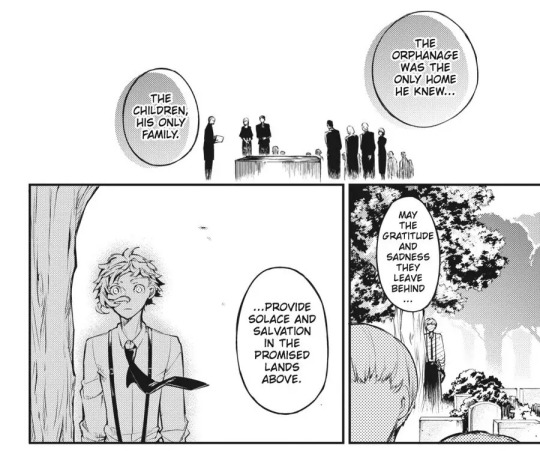
Chapter 39 reflects my points the most, and at the same time, it also turns out to be one of the most controversial chapters. It surprised me that it is, but maybe I shouldn’t be considering how most people on the internet act about abuse. It’s a lovely chapter to me personally and one of my favorites.
If you need a refresher, this is the chapter the Orphanage Director died in and leaves Atsushi in an emotional frenzy about what to think and believe. I know that the underlying message of this chapter is confusing to some, but it hit me in the face point blank on how this is about facing your abuser’s death without any personal conclusion with them.
Being sent on an investigation, Atsushi, after finding out the body was the Director, is stunned and scared because he knows nothing of the director other than his cruelty. He immediately assumes the worst and that he was coming after him again. Atsushi’s thoughts against him are entirely… on purpose in the director’s intentions because we find out that he has gone through so much violence and loss himself that he’s projecting his own will onto Atsushi and making sure he’d “survive in the real world”. So he became his first figure of hate and violence earlier in his life so he��d be “prepared for what comes next”.
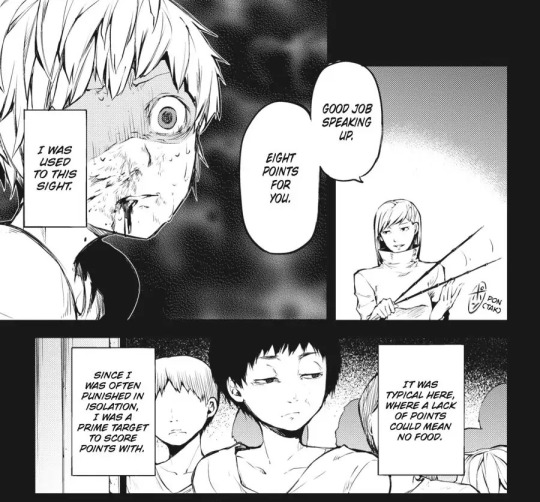
I know so many take the backstory for the director as a way to justify what he did to Atsushi in the narrative, but it was just to put into context why he was so cruel. Abusers are never cruel for no reason, that never makes it right, but it’s reality. Atsushi was not the only one in the orphanage who was treated badly, he was singled out by the director most likely for an ability he couldn't control because the headmaster knew he’d get the most trouble for it, and unfortunately… he was right.
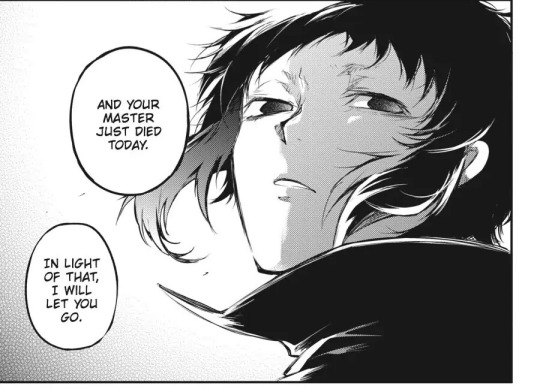
Akutagawa being his informant in this chapter makes perfect sense. He can see that what the director was for Atsushi is what Dazai is for him. No matter how terrible their actions were, it’s what kept them alive for so long. It’s not pleasant to confront, is it? Atsushi agrees because when he gets the information that the Director was going to congratulate him with the flowers he was going to buy by selling the gun he had on him, he freaks out. No way the guy he was raised so long to hate, the guy who put him through so much suffering, was going to congratulate him.
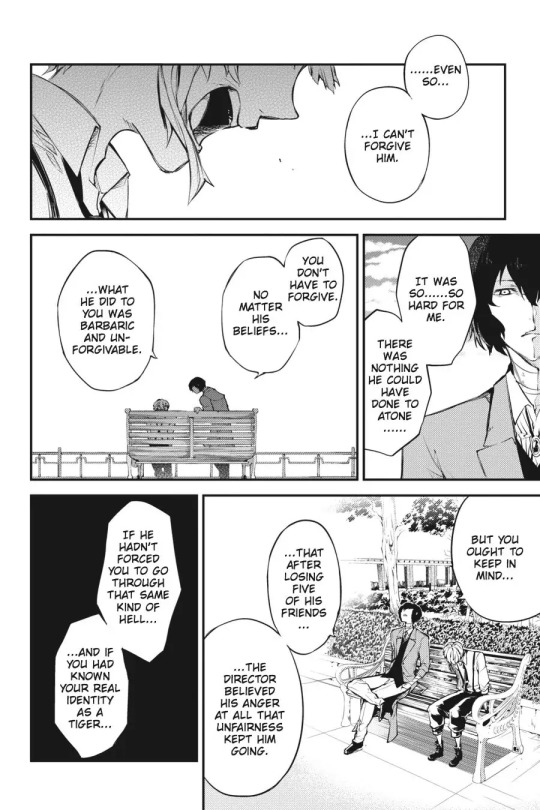
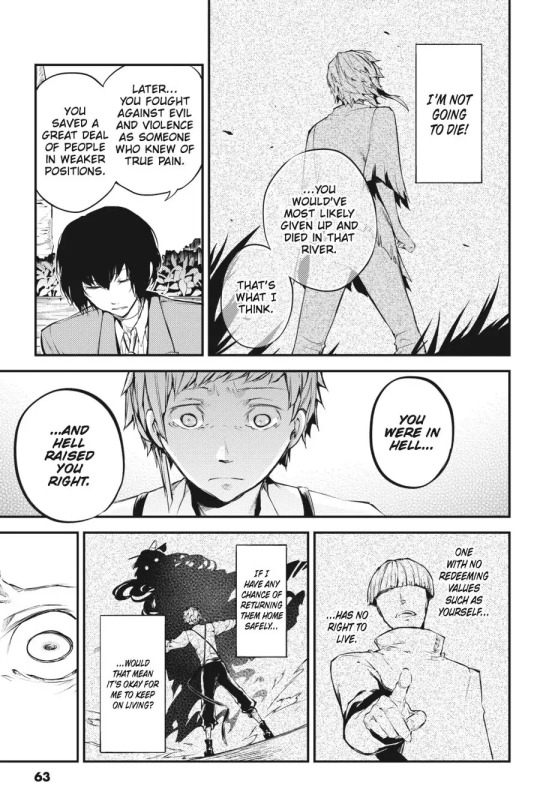
I know to some, Dazai’s talk with Atsushi sounded like he was justifying what happened because “it made him a good person in the end”, but that’s not what’s being said. This conclusion I’ve seen some people come to about this conversation confuses me. Dazai is just saying the obvious, you guys get all shocked and it weirds me out how easily it’s been glossed over that the reason Atsushi is so self-sacrificial and trying to do the good thing is because of the director. The reason he puts himself so much on the front lines is because he needs that worth in being good to live and prove the director wrong, he was raised to see that type of person is the most ideal person to live in this world.
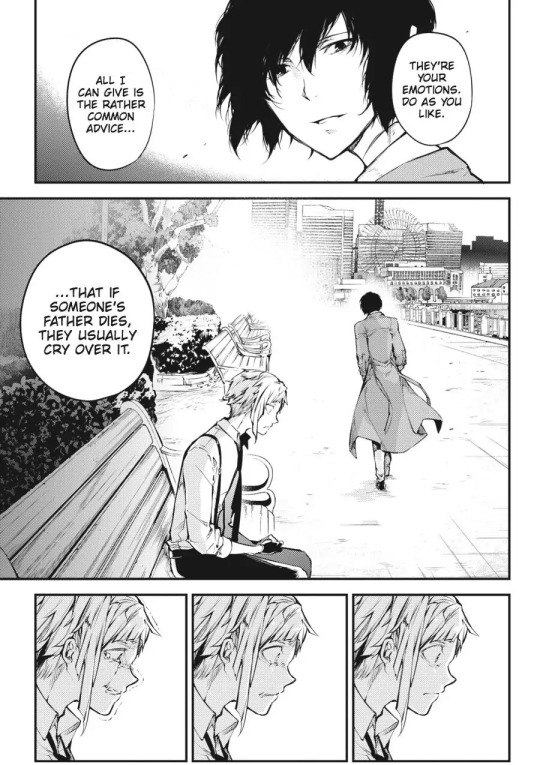
After everything that’s been dumped onto him in such a short time, so much inner conflict of what to think of a dead man he no longer can have any personal closure with, he asks Dazai what face he should make, what he should think at this moment. Dazai tells him that they’re his emotions and he can think however he’d like, but commonly someone cries when their father dies. So he cries, because ultimately no matter his treatment, no matter the intent and its effects, it’s still the man who raised him. It’s flawed, but that’s what a father is stripped bare at its core definition and that won’t change no matter your feelings.
Now that I’m done summarizing this chapter and making sure you guys understood the point and how it spells out their relationship, I can finally talk freely about what was happening between them. When it comes to familial abuse, generational trauma is so prevalent it’s hard not to talk about. The director is quite reflective of so many parents who were raised to grow up too early in harsh environments, that they think they need to prepare their children for it too, even though it’s no longer needed.
You don’t need to like someone for them to be important to you, especially if it’s a parent in your life or someone close to that. That’s why Atsushi cries. He cries for the director, he cries for himself, he cries that it’s finally over, he cries for the kindness he could’ve gotten even if it wouldn’t have fixed anything, he cries for the father that never was, he cries because his father is dead. It’s perfectly normal to keep someone close in your heart that wasn’t perfect and to grieve their death.
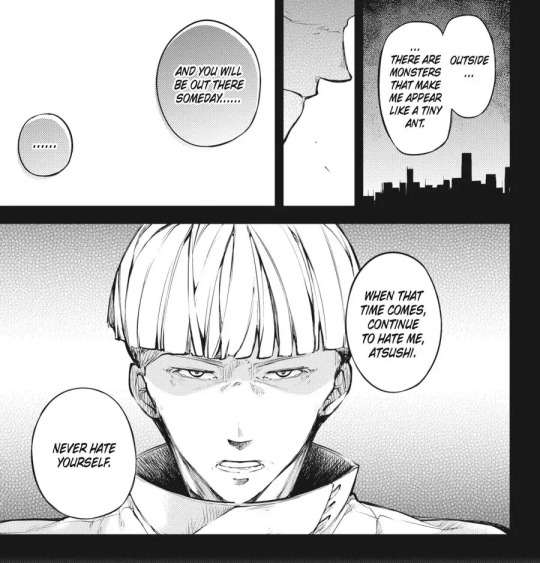
Was the director successful in what he was aiming for? I want to say no, but he did. He succeeded in making Atsushi think of others in a good light and do good for them, making Atsushi resent him, and giving him the ability to keep going. Hell raised him right, but it was still hell. The problem is that his teachings were based on degrading Atsushi into being nothing but a life he should put aside in favor of others. Even if he continued hating the director like he wanted, he would still degrade himself for being a coward who didn’t hold himself to those standards. The result is not perfect because the director is not perfect, but in his position, this is a success.
The director for a while was his shadow of negative encouragement when he joined the agency, what kept him going in those moments, because he was what defined good, bad, and justice for him in his entire childhood. Even if he was dead, he’d still linger in his mind. I can’t parse out what to think about these hallucinations forming Akutagawa and Dazai to guide him later on, all it tells me is that he still can’t rely on or trust himself and he needs more development in his self-image issues.
I see why fans are confused, hell raising us right is a bizarre thing to say to a victim, so let me show you a perspective you're not seeing. Let's imagine you have an abusive mother who only wants you to be prepared for the things you're undoubtedly going to experience because of what you can't control. What she did does help you, but all that goes through your head is “Why couldn't she have done it differently without my own suffering?” The only thoughts that come rushing back when you think of those memories are the unnecessary pains. It takes a lot for a victim to acknowledge this on their own, they want to push back at the past so they don't have to see this plain reality.
Like anyone else that I’m going to bring up in this post, just because the abuse made them who they are or affected who they became, even when it keeps us going through life and benefits us in some way, does not make the abuse justified. Abuse is still abuse, I addressed this already and I hope not to address this again. I needed to detail an explanation because it’s quite easy to hate a man you know nothing about and has been painted in nothing but a bad light. The anger against the director is undebatable because abuse is not debatable, but to pretend the cruelty was nothing but for cruelty’s sake is mischaracterizing both him and Atsushi.
You can’t pick and choose what’s been told to you in the text just because you don’t like a character and lack the maturity for it. It gets quite hard to do that sort of thing when it’s a character you‘ve grown to care about, it’s no wonder Dazai is divided between so many. Speaking of Dazai, his involvement in this makes as much sense as Akutagawa’s. He’s currently in a mentor position for Atsushi, no matter what Akutagawa says, and shows interest in his development. So of course he’s going to purposely stick his head into something that would affect Atsushi greatly. Both Akutagawa and Dazai are viewing this through their lenses as people who grew up in the darkness of society, and it’s not that Dazai thinks what happened to him wasn’t terrible, you should have eyes to read the panels provided, but he’s generally unfazed and able to sound neutral because he’s used to that cruelty.
The Port Mafia’s Environment
(Aka: is it really “all Mori’s fault” or is it just the product of being literally in The Mafia™?)
I’ll go over the “Cycle of Abuse” in a second, but please keep in mind that you can’t just blame everything on Mori. Just like the Director, it’s so easy to pin the guy who’s just been the worst for every problem there, but it decimates the other characters involved as well and makes what they’ve gone through go flat because you’re restricting it to a misinformed presumption.
To make a bold statement, I need you to completely throw away your idea of what the abuse cycle is. The Mori to Kyouka pipeline being the singular “Abuse Cycle”? Garbage, needs to go away too. I've seen many fans use the term “Cycle of Abuse” too carelessly, and while from afar the way they're using it is not technically wrong, they have the wrong thought process behind it.
The Cycle of Abuse is simply the patterns of what keeps us in an abusive dynamic and negative mental state, either with an individual or environment, and makes it incredibly hard for anyone to leave. It’s not the actions you take that make it the Cycle of Abuse, and it's not just one straight line of people going through similar motions. You don’t have to be someone’s abuser to be the one who keeps them there, if you feed into it you’re still a problem. Even if you don't actively add to it yourself, just staying there as a bystander and not trying to do anything to change it or speak up for the victim when you clearly could also still make you responsible. Just with your presence, it validates what they've gone through as normal.
If you need more of an explanation, two opposite examples include Higuchi & Akutagawa and Beast Kyouka & Atsushi. Higuchi is a traditional example in that she stays in the mafia because of her relationship with Akutagawa, and stays by his side for reasons unknown. What we do know is that she’s incredibly indebted to him enough to care for him to an extreme extent, but their relationship is abusive all the same. Beast Atsushi and Kyouka sounds strange for me to bring up, but this is an example of a non-abusive person contributing to the Cycle of Abuse. Instead of taking her out of an abusive situation, he brings her back in.
Many characters are a part of this main narrative of abuse in BSD, so it's not inaccurate to say Mori, Dazai, Akutagawa, and Kyouka are a part of it as well using this definition as all of them are the reason or contributed to why someone was stuck in a negative, abusive situation or the victim themselves. I’m guessing none of you are genuinely referring to this though and are referring to intergenerational abuse, a repeating cycle of younger generations taking after their abusers when they're older, which is a completely different phenomenon. Both are referred to as cycles and have many commonalities, but it’s not the same. Not to sound like a total dick, but this barely even applies to them.
Not because the concept is based on familial relationships, it can happen with older figures in your life too, but because our oh-so-famous Abuse Cycle gang does not have that commonality to make that claim. They have narrative parallels, but that’s pretty much it. I will save what I have to say in their sections, but Mori and Akutagawa did not abuse Dazai and Kyouka respectively for this type of claim to have any legitimacy. Kyouka certainly broke a cycle, but not that kind since that would need her to continue it in the first place and then prevent her own experiences from even affecting the next child.
What do all Mori, Dazai, Akutagawa, and Kyouka actually have in common? They are/were in the mafia, using their natural talents of cruelty for the underworld.
The Port Mafia resembles something of an abusive household or community that sees so much of what’s done to others there as normal, and constantly compares it to how it was with their old boss and thinks, “At least it wasn’t as bad as that.” It’s quite like the Orphanage Director’s thinking but on a larger scale. Does that make everyone in the Port Mafia abused? Nope, unlike most abusive communities, the Port Mafia is quite literally the mafia. Everyone is there for different reasons, at different ages, and different experiences. Everyone is taken advantage of in these situations, no matter the circumstances, but it doesn’t make them abused automatically.
So it’s hard to have a stance on anything about them being abusive other than the mentor situations in the Port Mafia don’t see abuse as abuse and just another way to teach their subordinates to survive in their world if they deem it necessary. Was Chuuya abused, either by Mori or Kouyou then? I’m going to have to say I can’t tell you that. We don’t have enough information on either of his dynamics with them to say that they’ve directly had any repetitive behaviors of direct harm against him specifically, and there's no reason for them to do so either. I’m not going to use the argument that “Chuuya doesn’t hate or fear them, so that must mean he wasn’t” because again, that type of response does not reflect so many situations.
Chuuya was still harmed by being in the Port Mafia as a teenager because nobody should have been surrounded by this much cruelty at that age. It doesn’t matter if he shows visible distress or not about the Port Mafia, he was just desensitized to it since his sheep days. So was he an abuse victim under the idea that being a child in the Port Mafia is abuse? That depends on who we’re speaking of, but in Chuuya’s situation, I'm going to have to say no as he's already internalized their mindset from his own experiences separate from the mafia. Keep in mind that it also still holds true that you can find family in situations like this, it’s not mutually exclusive. Some just find more comfort in what they’re used to than what would be better for them. Kyouka is a better example of someone being a victim of an abusive community.
A false claim I've seen made many times are the ones where they have it as if Mori is the mafia itself or that he made the mafia what it was. It shouldn’t be too surprising, but it’s the opposite. Mori already held flawed, heartless, calculative methods when in situations he thought required them. We’ve seen him as a soldier and an underground doctor, but we know nothing else about him outside of his cruelty, just like the headmaster. What he does is never for what he thinks is for his benefit, but for the sake of something larger. Whether it’s for the city, the country, or eventually, the Port Mafia.
The mafia is the first time he’s been put into a position of absolute leadership and is not yet accustomed to that at the beginning of Dazai, Chuuya, Age Fifteen. He’s able to quickly fit the mold of a mafia boss, but there’s that bit of honesty that peaks through in this light novel in the first and last sections that’s ignored too quickly. First Mori complains about nothing going immediately right, questions himself about Dazai, and becomes genuinely stressed if it was the right decision to involve him, then confesses that he sees himself in Dazai to him (and him and Fukuzawa in Soukoku in private), and finally gives his honest take of leadership to Chuuya.
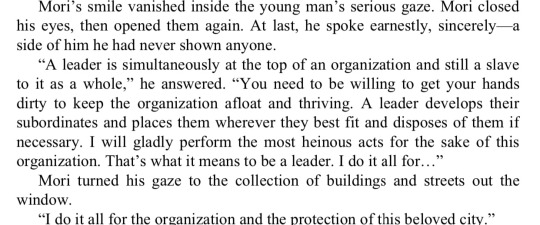
I already go over Mori as a character in one of my other posts and will speak more of him later on, so I don’t want to reiterate the same points, but here we have proof he has (albeit poor) humanity. He did not become the Port Mafia boss for his own selfish gain of power if you’ve forgotten, but because Natsume introduced him to becoming part of the Tripartite Framework to protect the city he loves, it’s where he’d excel best in this plan. The Port Mafia was already a shithole, Mori just made it livable again by becoming what an organized crime group needs.
It’s what makes the dynamic between Kouyou and him so intriguing because you have an abuse victim who has embraced the environment she was forced back into, but won’t let go of someone who’s proven to be more of a decent leader than her tormentor and can be relied on. For victims who couldn’t get help or realize they needed help, the easier path is to accept this is your life through some justification. While I said the Port Mafia resembles an abusive community, communities as such aren’t purely terrible and that’s what keeps them justifying it in their head. The family you have for yourself, whether it's a made one or the one you're born with, is what sticks for you.
Like it or not, Mori isn’t stupid. He takes risky gambles that backfire on him sometimes, but he’s good at his job. He’s brutal enough to prove his own against the people who didn’t think he should’ve been boss and outsiders who want to go against the Port Mafia, but he’s considerate enough towards his people and shows enough competency to be perfect for the job. He’s not a great human being, but what did you expect? He no longer had any room to express that humanity, he never had; there was no benefit from being a good person in his line of work.
The Heartless Cur
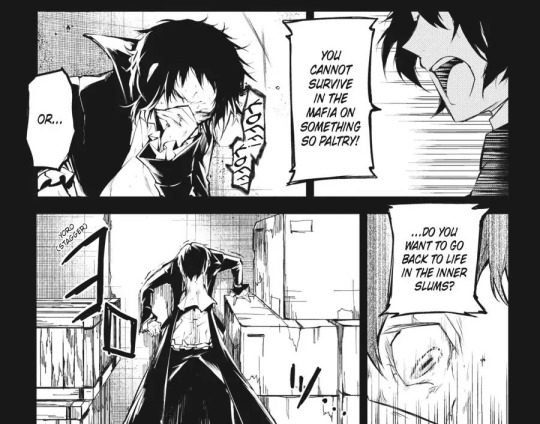
That looked like a great segue to talk about Dazai and Mori’s dynamic, but it’d benefit to go over Akutagawa first. For those who do acknowledge it as an abusive situation, Thank you for at least taking that step. Numerous don’t and it worries me at the state of what’s considered abuse vs. training. It may be both at times but don't excuse one for the other. Training needs formal consent and communication at some point during a session. Akutagawa is learning, but it’s the same as getting yelled at as a child for not doing your homework right, when again, you’re still just learning.
It might’ve been easier to see for those who do acknowledge it because of the visible physical abuse that happens, but let's not undermine the psychological abuse happening as well. Dazai has messed with his psyche on an abhorrent level through his degrading and threats, making him reliant to hear a single word of acknowledgment from his mouth. What happened to Akutagawa is beyond the mafia’s environment.
Akutagawa does not hate or want Dazai dead for what he’s done to him, but he does hold anger at the seeming abandonment he’s been put through… and at himself as well. Anger that he couldn't get to what Dazai wanted him to be before he suddenly left. So he proves himself by climbing the ranks and becoming someone feared. Spectacles of violence not because he enjoys the feeling of other’s suffering or the power over them, but to show Dazai that see? He's still worth looking at!
He stays in the mafia because he’s found a place there. Even if he could, there was no point in leaving the mafia after he disappeared because what would be left for him if he did? He will always be an unchangeable, horrific hound of the dark and there's no changing that in his mind. From an inference of his actions in the dungeon when they finally reunite one-on-one, he wanted to believe that he was above Dazai after all those years, but Dazai doesn't act impressed or scared or anything. After all that effort, he gets nothing but ridicule and mockery like he's back to being that little kid with an oversized coat too big for his body.
Worse is that he gets told that some new kid Dazai picked up, who didn't train to the extent he did to refine his abilities, is better than him somehow. He gets riled up and at first, takes out on Dazai, but all those threats about killing him and how he went against the mafia were empty. Even now he can't bring himself to hate Dazai, he needs his mentor to acknowledge him no matter what side he's on. He never let go of Dazai, his coat is proof enough of that. So he takes it out on the party that isn't responsible and is convinced he needs to overcome Atsushi to prove something to Dazai.
He doesn't hate Atsushi, not genuinely. He does the same when he’s told he’ll never compare to Odasaku, someone who objectively should’ve been the weakest member due to his status. He gets angry at Dazai’s words, gets angry at himself, then takes it out on the person mentioned, rinse and repeat. I’m not sure if I’m the only one to notice, but he genuinely believed that the meaningful life Dazai gave him laid in the mafia and being useful to its cause. He has no reason to be as loyal to the mafia if he didn't think this.
Dazai’s acknowledgment means more than just appreciation for his skills and strength, it means his life meant something by striving for being the strongest. It’s not about the acknowledgment at all. Whenever he critiques and shames Atsushi for how he lives his life, it just feels like he’s unknowingly shaming himself through him without having to acknowledge his wrongs. It makes me curious about how much the acknowledgment itself even matters to him and the validation it gives him to strive for this is an excuse to keep living so what he’s doing in the mafia even matters in the end. What counts as acknowledgment to him?
He's convinced his faults are what made Dazai turn away, he just doesn’t know how to do anything to fix it and can't fix it this late into the game. What does Dazai want from him other than being stronger? When Dazai directly asks him to do something important involving Atsushi, he’s confused. He has no reason to trust him to do these missions. He’ll take the chance to prove himself once and for all, but to be included means he's being acknowledged, so what gives? The number of times he visibly self-reflects can be counted on one hand because as soon as it shows, he goes back to justify his violence and ignores his faults.
As someone whose favorite character is Akutagawa, I’m disgusted that all people can take away from him is “Akutagawa is an obsessive fanboy that deserves no sympathy because of what he did to Kyouka” or “Akutagawa is a poor, miserable man that didn’t deserve what Dazai made him into and should be absolved of responsibility because it’s all Dazai’s fault”. Both are very shallow and very harmful to perpetrate as they continue the idea that a person can only be the abused or abuser. He's both and it's okay to admit that.
Quickly let’s clear up this: He is not the way he is because of Dazai.
What Dazai IS responsible for:
Akutagawa’s need for his constant approval and recognition
Akutagawa learning to hone his ability
Akutagawa’s toxic views of being useful
The reason Akutagawa’s still alive
The reason Akutagawa is the Mafia’s dog
What Dazai is NOT responsible for:
Everything else
Akutagawa’s lean toward violence, his one-track stubborn mindset, and his lone-wolf attitude are not a product of Dazai’s treatment, he’s always been that way because of his time in the slums. He got beaten down by adults frightened of his empty gaze, had to learn to protect himself and find something to eat to survive, helped take care of his sister Gin and his friends by himself, and everyone constantly dying around him. That’s the real reason his personality is like that. He is a victim of his circumstances in a society that deemed him worthless, so he also thinks of his life as worthless. That’s why Dazai means so much to him.
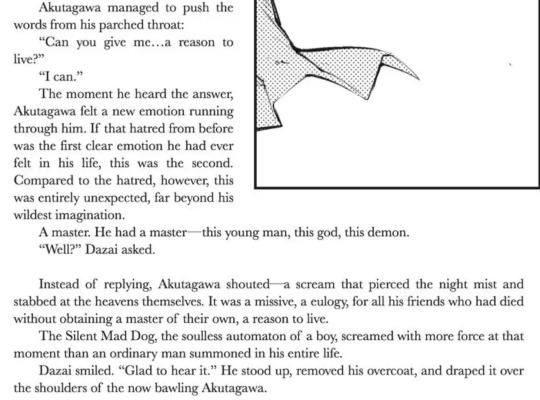
Dazai did not trick him into joining the mafia, Dazai expressed what he was going to go through was worse than what happened in the slums and gave Akutagawa an out that he could live a normal life with enough money, but he knew Akutagawa would not refuse because he still needed meaning in living, just like him. Gaining enough money to get by so he and his sister could get out of the slums would do nothing for him, he already felt that his life was worthless. He has no problem throwing it away at any time, he was gonna die young regardless because of his lung disease. It has manipulative undertones, but that's how Dazai usually is with even the people he cares about.
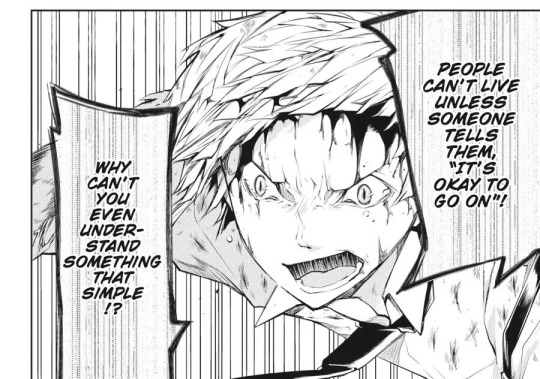
Akutagawa knows too well that a person needs a sign, someone to tell them it’s okay to keep going, and so does Dazai. Part of Dazai’s goal is to save Akutagawa from dying and give him a reason to live like he promised that day because he sees the potential that could come from his development. I don't want to sound like a dick again, but you’d have to be dense to think Akutagawa would still be dead by the end of this arc. He isn’t sending him off to his death, Dazai doesn’t know everything.
Even if he knew Akutagawa might die there, it's better than both Atsushi and Akutagawa dying at that moment. If Akutagawa didn’t want to die for him, he wouldn’t have, he chose to save Atsushi’s life. This is why I have to defend Asagiri. Let’s reread the interview together, to make it get across already.
(Twt link)
Q: Just like how Akutagawa and Atsushi's relationship has changed, I could feel the relationship between Dazai and Akutagawa moving forward too. Is it like what Akutagawa has said in Episode 3 of Season 5, that every order he has received from Dazai so far has been "a trial", "a part of a meaningfull life"?
First, the question being asked. They’re asking Asagiri about their relationship in the present, and how it’s developed. Akutagawa is no longer thinking he was abandoned by Dazai for a new, better student like he was made him believe, that was just to rile him up and interact with Atsushi more. Instead, he realizes that he’s not supposed to work against Atsushi, he’s supposed to work with him. How he decides to go about that battle with Fukuchi and whether or not he works with Atsushi like a partner is his trial. If this was Akutagawa before he met Atsushi, he would’ve no doubt escaped or might’ve thought defeating Fukuchi would prove himself to Dazai. He's not an obstacle to his meaningful life, his quest for a meaningful life lies with Atsushi.
Asagiri responds with:
Asagiri: Needless to say, Dazai is the most qualified person in this world to help Akutagawa grow. Dazai has a vision for Akutagawa's development, and he completely understands what it takes to achieve it. We, as obsevers, can only see bits and pieces of that vision. But I can at least say that Dazai's training plan has never been wrong.
Many find this answer questionable, I was stunned reading it myself. Asagiri is not wrong at all here though, Dazai is objectively the only person in this series who can find a way to help him. Atsushi is the endpoint, but Dazai has been guiding him to this point. Dazai himself said that he was planning to team them up the moment he met Atsushi, he was still thinking of him even after all these years. There are much scarier implications than thinking that Asagiri was wrong. It's that Dazai was doing everything intentionally to get Akutagawa’s mindset where it was. He didn't mess up with Akutagawa, he just couldn't personally teach him the skills he needed and chose a different route until he found something that could.
Asagiri is not saying the abuse was morally justified, but the intention behind it was not wrong in an objective stance. Dazai would know what to do the most because of his understanding of wanting to find meaning in living. Teenage Dazai couldn’t have achieved much by himself, even if he could understand since he also could not find meaning in life. That’s why he made him hang on to his every breath of validation so he would keep his faith in Dazai long enough for him to find a solution to this dilemma. The moment in life when he found Akutagawa was not ideal and he still did what he thought he had to do for him to survive in the mafia. Without his ability, he's incredibly weak and needs to be able to defend himself. A violent person could not have made another violent person unlearn their violence.
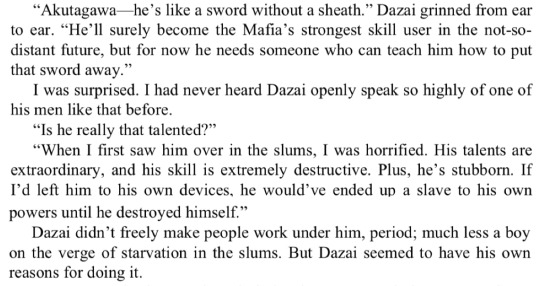
You could say he just wanted a weapon, but that’s not it, not even close. Many of you are stuck on the part that it was a suicidal teenager that picked Akutagawa up from the slums and that no way someone like that could teach another suicidal teenager anything, so it’s “comical that Asagiri thinks as though he’s the most qualified”. You’re not wrong in some sense, but this is still incredibly intelligent, “Black Wrath of the Port Mafia”, Osamu Dazai, and not just some suicidal teenager.
He’s also no longer a teenager. Right now we’re talking of Dazai in the present who’s grown and no longer needs to be how he was in the mafia, he has Atsushi now, someone who can help Akutagawa see what’s wrong in his outlook. The only thing he could’ve done back then was to shelter Akutagawa so he wouldn’t kill himself. It's horrible, but Dazai validating where he is now would do no good for either of them and fix nothing.
Q: What kind of person is Dazai to Akutagawa?
Asagiri: Actually, at the time of "The Dark Era", Dazai already spoke very highly of Akutagawa, as someone who would "become the Mafia's strongest skill user in the not-so-distant future". He just doesn't say that in front of Akutagawa himself. The reason he doesn't say it is that Dazai has to be "the presence that continues to give meaning to life" to Akutagawa. So far, that trial has been completely successful.
None of what Asagiri brings up is new information. He doesn’t say it in front of Akutagawa not to spite him, but if he gives these praises out too freely, he loses his distant, almost god-like presence in Akutagawa and will go back to being just a lone wolf with no exceptions that will carelessly get himself killed. Without any goal, he’s lost. Just like Atsushi and the headmaster and how Atsushi hinges on proving he can do a good thing to motivate his life, Akutagawa similarly hinges on the fact that if he fails, he won’t get Dazai’s approval.
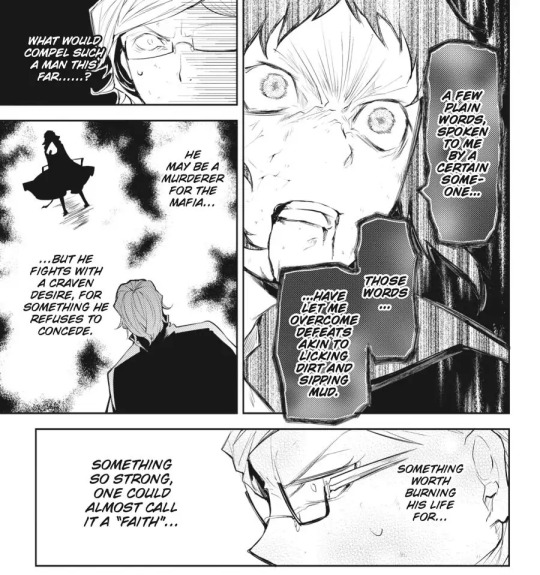
However, his death was not fully about Dazai’s approval in the way he's been preaching. In chapter 87, he mentions Dazai’s approval like always, and when they fail the first time even after trusting and working with each other as Shin Soukoku should, It hits him. What came into his head I cannot parse out at the moment, but his actions speak so much louder than any explanation we could've gotten. Of course, he's helping Atsushi escape, but what does he do for that? He used his ability on his shirt, and not just on the coat like he typically does.
It doesn't seem like a big deal at first, he could've always done that, but when was the last time he used it on something that wasn't the coat Dazai gave him? The coat means many things. His new beginning, his path in being Dazai’s student and successor (as that was also Mori’s coat), but it also conveys Dazai’s will that keeps him alive and that he's only strong with his coat. Without it, he's defenseless, so he clings to this coat the exact way he clings to those orders. It's his encouragement to keep going when Dazai isn't there. This overwhelming, suffocating responsibility, an oversized coat, is a lot to give to a kid but it's comfortable and he’ll grow into it eventually.
It was already a huge step in his development that he gave Atsushi his coat, but to use his ability not on his coat means he's making an effort to overcome his fixation and do an action unrelated to Dazai for the sake of Atsushi’s life. His whole life after the slums, everything he's ever done was with Dazai in mind. Him saving Atsushi’s life was not because he was doing what Dazai wanted him to do, that he'd finally get approval for doing It, and in turn give his life meaning before he died. When he saved Atsushi, it would give his life meaning in just that. He shouldn't let himself be defined by the past the way he criticizes Atsushi for, so he’s going to choose his meaning. I wouldn't say he's moved past Dazai yet, but he's getting there.
Dazai and Akutagawa’s relationship is not healthy in the slightest, and Dazai’s crueler actions and words against him are not right, but they’re still growing and not stagnant characters. Atsushi and Akutagawa learn from each other and that's what's pushing them to change. Nobody will pretend those past means weren’t just abuse, they were, but there's so much more to it. Like I asked with the director, was he successful? Well from what I’ve said, yes it so far has gone the way Dazai hoped for in the best-case scenario.
In the main universe at least, this is one of the better ways it could’ve gone. Beast is a different story. Teenage Dazai of the main universe was unsure of Akutagawa’s future and did only what he could’ve done at that time, but Beast Dazai does have that knowledge and he decided that it would be best for Akutagawa to not be in the mafia, instead bringing in Atsushi. It wouldn’t have been good to let him pursue his violent tendencies more than necessary in the mafia in this universe when he knew there was a better option, especially with someone like Oda, who would take the time to care for him properly.
Even if he didn’t bring him in, he still gave him the motivation to keep living for something. The prologue of Beast is a mirror to The Heartless Cur, with instead it’s a distant relationship of hate Akutagawa has for him for taking his sister. For those who argue that since Beast exists, that means Asagiri was somehow “wrong about Dazai”, but it’s still Dazai from the beginning that’s the source of this motivation. Dazai, who's still guiding him. If we’re gonna be honest, Dazai was putting their development/capabilities in speed run mode with the logic and future information he had access to prepare them for a timeline he won’t be alive for. There are many factors for what he did in Besst, but that’s not the conversation.
What does he get from helping him? Who knows, Asagiri wasn’t being cheeky when he said we only see bits and pieces of his vision. We barely have any clue what’s going through that man’s head, so don’t act like you do. He wasn’t always planning for the next Soukoku. Maybe it was a thought that came up sometimes, but he’s only met Atsushi recently. What about Akutagawa was so different from any other powerful ability-wielding orphan? Well, we’re not gonna know any time soon.
The point is that Dazai is thinking about their future, even if the abuse or manipulation makes that hard to see. Please do remember that abuse is still selfish no matter the intention, but non-selfish intentions make it all the more complicated to process. Their relationship is not misunderstood by Asagiri himself, it’s just clear to me most don’t want to face the unpleasant truth that there is more to their dynamic. When I first realized what was going on, I couldn’t help but get unnerved and awkward when someone would ask me about these two. These are both characters in the spotlight that you’re supposed to care about, but what happened between them is rotten.
You’re not supposed to pretend it didn’t happen because Dazai still contributed to who he is and it shows whenever it’s on screen. Abuse doesn’t make us stronger, don’t make it as if that’s a message that Asagiri is spreading. What happened to him motivated his development, but with Atsushi, that’s the opposite. Their circumstances are different and victims process what's happened to them in various ways. Depicting it in a form less common than usual doesn't mean the author thinks in the same way the victim does, it's just nuance at work.
I did not add Akutagawa’s attitude towards his subordinates and newer members as Dazai’s responsibility because Dazai is not the one controlling his hands when he hits Higuchi. Dazai’s mentoring contributed to his toxic views of being useful, but it’s only Akutagawa’s responsibility once he raises his hand. Instead of thinking of this in the context of the most typical abusive situation you can think of, how about this:
Your parent was raised in an abusive household, but they think they came out of it just fine and that there was nothing wrong with how they were treated. They treat you almost the same way, and all you can take away from that when you find out is, “At least it’s not as bad as it could’ve been”. You still hold anger at the standards they’re forcing you to reach, but if that’s what it takes to get that approval, then you’ll keep going anyway. Even if you get yelled at and you know you shouldn’t be treated like this, it’ll feel nice when you finally get on their good graces, right?
Then you get a new sibling, and all of that comes crumbling down. They don’t treat your sibling anywhere near the same when you were that age. Years go by and you get angrier and angrier. Why is it only you that was put to that standard? Even worse is that they treat you differently now too. You finally got to those standards, but now what is it worth? They’re so much nicer now and you want to curse them out for only changing now. Why couldn’t have had that parent from the beginning? It’s so unfair, but you can’t take it out on them because you still need them, they mean so much to you. As angry as you were, they were doing it because they cared about you in their way, you think. It was what your grandparents did to them at least. So you start treating your sibling similarly to how you were treated because you can’t take it that they didn’t experience that hardship without destroying yourself first.
Question: Are you right in what you did? Was the parent responsible for what you did to your sibling?
Nobody in their right mind would say yes to that first question. It makes sense why it happened, but continuing abuse will never be the correct answer. You’re doing the same thing your parent did. The second question needs more exposition to answer, however. How responsible is responsible?
In the end, even if it was the parent who influenced it, you’re only responsible for what you’ve done on your own accord. The parent did not tell you to take it out on your sibling, you decided that yourself. The parent is still responsible for what they’ve done to you, never get that wrong, but if you say that your guilt is absolved because it’s all their fault, you sound no different from any other abuser in denial. Are you saying now that the parent is also absolved from guilt because it’s all their parent’s fault too? Listen to yourself, You hurt someone but it’s not your fault, but the person who hurt you is also somehow not at fault? If someone came up to you and said that, you’d be fed up.
For those who do the same thing with Mori, rethink what you’re saying. Is it that painful to admit your favorite characters are at fault and that they’re changing? This comparison isn’t perfect and ignores some key factors: Dazai isn’t Akutagawa’s or Atsushi’s father and is not much older than them, the Port Mafia is a violent workplace environment and requires you to be able to navigate it a certain way, and all three of them at adults in present time. I used this comparison to be more real to earth and something a larger audience could process themselves to truly get that the emotions here are not straightforward even in a realistic situation.
Re: Portrait of a Father

Just like the prologue, in chapter 3 of the Beast light novel, Portrait of a Father is mirrored and retold in brutal upset that does not hold the hopeful bittersweetness at the end of it unlike its original. Before the present day, against all orders Dazai gave him, Atsushi attacked the orphanage on the day of his birthday. On his birthday, he would be reborn from the ashes of his past being burnt away, and kill the director inside to release himself from the fear of those memories.
It’s what he says at least.
Playing out, the director was expecting him. There might have only been one person in his mind who would’ve attacked a rundown orphanage on this scale. It frightens Atsushi after all that planning and fear of losing to the director, he could still see through him, but confusion takes hold when he’s told that he was late for his graduation.
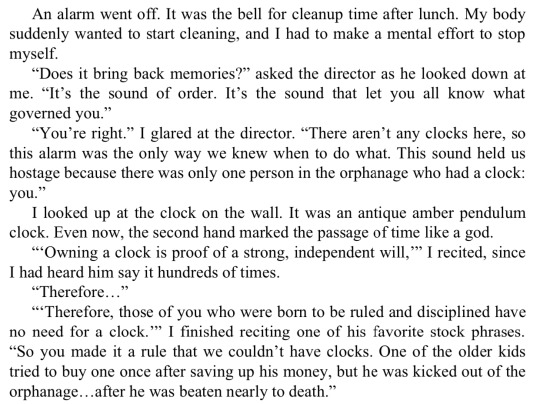
Graduation? Atsushi is in fight or flight mode, why is he approaching him with this box? He can’t imagine it being anything other than a weapon, nothing else would make sense for this cruel monster. The director won’t give him any straight answer, just repeating words he’s heard over and over growing up here. He uses his tiger hearing to glean what could be inside.
Tick. Tock. Tick. Tock.
There’s the proof, it had to be a bomb. He needs to protect himself before anything happens or he’ll die. He’s scared, he can’t move, but he has to fight. The director opens his arms for the embrace of his child… and death, plummeted into a bloody mess on the floor. Only out of the corner of his eye, only when Atsushi stopped, he saw what was in the box. It was a watch, brand new and high-end. Happy Birthday was what was written on a sheet of paper next to it.
His last words, whispered into his ear, were words of encouragement: “Yes… just like that.”

I was not kidding when I said this was brutal. Just like in the main universe, Atsushi learns why he did what he did and can’t place any of his feelings, but overwhelmingly guilt crushes him to keep protecting people with his life rather than just fear because he killed him. He finds out much earlier about what happened with Shibusawa, and how the director protected his identity as the tiger.
The director’s intentions are draining when you let your mind wander. As we’ve established, the headmaster as a figure of hate for Atsushi is intentional on his part. He doesn’t explain anything on purpose here to probe him into killing him. He bought that watch for Atsushi as a congratulations for growing up and becoming a new independent individual.
In the split minute before Atsushi took the first swing, he said his usual, “Those who fail to protect others do not deserve to live.” I have to question now if he was so willing to die there, even encouraging him to kill him, then has it been this whole time he still can’t live with himself for what happened to his friends… or is it because he couldn’t protect Atsushi anymore? Maybe I’m overthinking it and it was just that the headmaster thought Atsushi needed to kill him to remove an obstacle in his growth as an individual, to be a necessary sacrifice for his benefit.
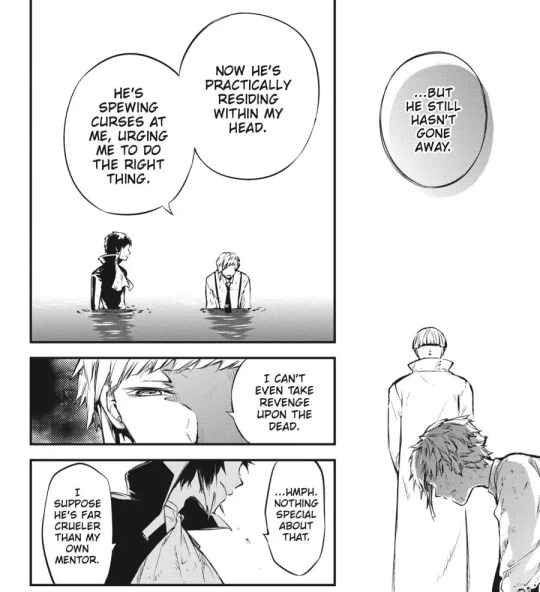
It's too flawed though. The director will never leave him, not after all that he's engraved into Atsushi. The watch has become not a symbol of a person who's found himself, but a child that's latched himself onto his father's cold corpse that won't ever respond, but that child would do anything to have him wake up and say "Good job, Atsushi". The director also has a clock, but can he call himself a strong individual when he hasn't let go of the past either?
Time stopped for Beast Atsushi when he picked up that watch. If he had just followed orders, none of this would’ve happened. If he isn’t his father’s child, if he doesn’t uphold his last wish, then who is he? When he’s no longer in the mafia and has time for himself to think, he wanders.
He failed in becoming someone he could be proud of, he deserved to die for that but doesn't want to be dead… because It wasn't truly about the Director, just like how it wasn't truly about Dazai’s acknowledgment or saving his sister for Akutagawa. At first, that was the motivation, it's the reasoning they keep going with, but in the end, it was to save their own life and give it purpose to validate why they're still around. If they can die like this, then it's all the same. If they have their own life in someone else’s hands, then they no longer have to be responsible for their own heavy-hearted weight.
Beast Atsushi is given neither and is taken of his reasoning, but he keeps going. Aimlessly.
Luckily, it’s not where his story ends.
He wakes up in his old orphanage, and it’s no longer the dreary place it was when he was younger. Kids laughing outside, no chains on the walls or bars blocking off the windows, and the new Orphanage Director greets him. He tells him that he will go back to being a student of the orphanage until he can become independent again, under one of Dazai’s last requests before he died.
Still, there’s one thing he needs to do. The new director takes out the watch and tells him to break it. Atsushi is distraught by this notion, but he won’t let Atsushi leave if he doesn’t. The new director has good reason, there is no point in becoming someone the past director was proud of and this is what’s holding him back. Atsushi, eventually, tells him he will not break the watch. He can’t move on just yet and this watch is still proof he’s himself, yet…
He’ll keep going and move forward, just like Akutagawa told him after he spared his life. The new director finds those words to be enough, saying he can’t leave until he finds something else to define himself with, but he can keep living here as his son. He went there to burn away his past and came out of it not able to let go of the past, but now he can redo and process it healthily with someone willing to hold him like a father should.
The Man Who Raised Dazai
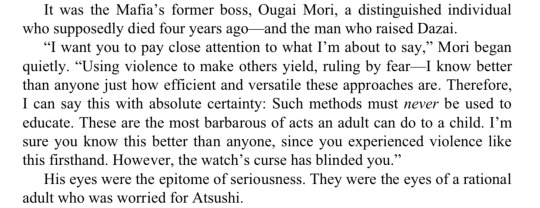
Everyone who’s read Beast has questioned it: Why did Dazai in his right mind have Mori take care of an orphanage? Why did he save his life? Better yet, why is he so nice?! I have come up with some speculation on why Dazai would.
“Beast Dazai recognized this potential of change either from the multitude of universes he was able to witness or recognized it in his own considering canonverse Dazai never does anything against Mori (even if he visibly dislikes him).”
“Possibility is one thing, the why is another. It was either that he saw potential and good that could come out of this in the long run, Mori’s intelligence and expertise still proves usefulness, less dangerous for Oda in the long run if he let Mori stay there instead of the Mafia, or all three.”
(Didn’t feel like rephrase them)
We can’t know anything for sure about his decision, but I do know Mori is the type of character to sacrifice his feelings for what he thinks would logically benefit the sum, and there’s no better way to release yourself from that too-calculative responsibility than to remove yourself from it and to be in a place where you’re allowed to care for others and express yourself when there is no greater purpose than to just grow.
What happened with Yosano is undoubtedly wrong, but Mori had put away any sympathy in those situations because he needed her to do what he brought her in for. I was confused by his declaration that violence should never be used to educate children when I read it, especially out of his mouth, but now I understand. He would know with certainty that it’s not the right way to educate children, particularly because this is a Mori that hasn’t been in the dark for these past years and has grown to care for these children at the orphanage without any greater intention for them.
He’s not like the Old Director because he has no reason to think these kids would end up the way he did. They’re just kids that need someone to raise them with kindness, kindness will be what gets them through life as functional adults. Abuse has too many drawbacks to be called an optimal solution here. Is it surprising that all it took to change Mori was the kindness and salvation Dazai offered to him when he took over? Can you believe it was that simple to treat someone like a human being instead of a figure of hate?

What sticks out to me like a sore thumb is that when he’s introduced in Beast, he’s referred to as the man who raised Dazai. He is, regardless of what you think, the closest thing Dazai has to a father figure. In regards to how the fanbase speaks of their relationship, it’s hard to think that he cared about Dazai, but he did and the extent of how bad it got between them is grossly exaggerated.
As many comparisons Dazai gets with Yosano, their relationship with Mori is very different. Unlike Yosano, he did not need to be forced to do anything with psychological abuse and he did not need to be torn down to do what Mori asked him to. We don’t know what happened to him to become like this, but it wasn’t because of Mori. Yosano had light in her and a motivation to do the right thing, but Dazai didn’t. Dazai is no stranger to any violence or using violence himself even before Mori if he's this desensitized.
It’s useful that Dazai is like that when he meets him, up until it isn’t. He’s moody and actively looking to die. Mori can’t predict him that easily and Dazai can see right through him. There’s another huge difference between them though: Mori sees himself in Dazai. We don’t have enough insight in his head to make conclusive statements, but I think this is why he cared for Dazai. It’s not because he saw a child struggling that he cared, but grew some fondness because he saw a little mini-him. When he drove Dazai out of the Port Mafia, he expected him to come back and take back his vacant seat.
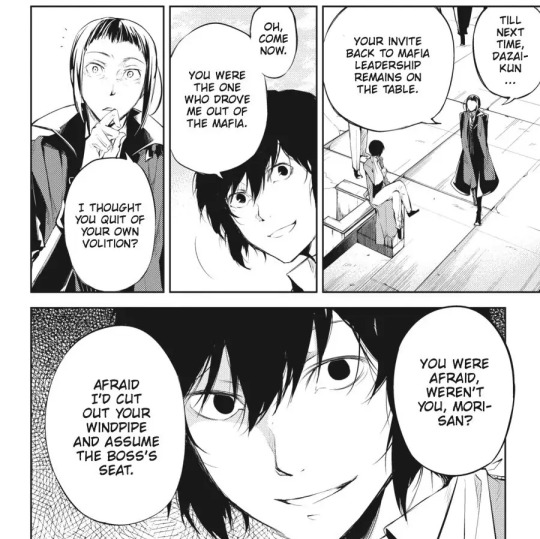
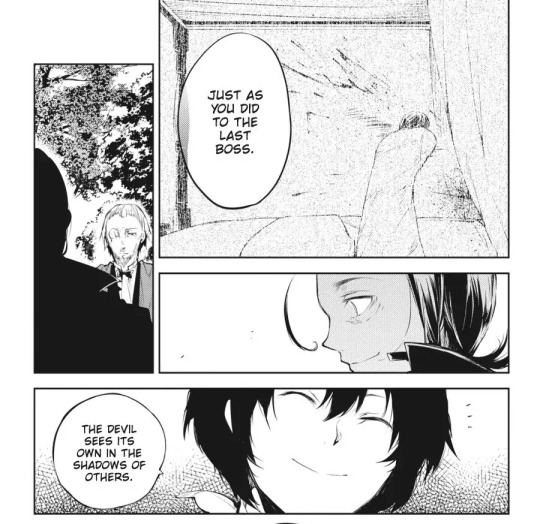
Eventually, Dazai will come back and realize that petty anger about someone dying is illogical in somewhere like the mafia. But because of him not being able to see through Dazai and seeing himself in him, he also expected him to eventually usurp his seat if he stayed any longer. That is why he had invited Mimic at the time he did and manipulated the situation so Oda, someone he knew Dazai cared for, would go and take care of the situation flawlessly. He’d be sacrificed and Mori could get something out of it, a Skilled Business Permit. A perfect plan… in theory, but Mori was wrong and miscalculated on many levels because of how many assumptions he made about Dazai.
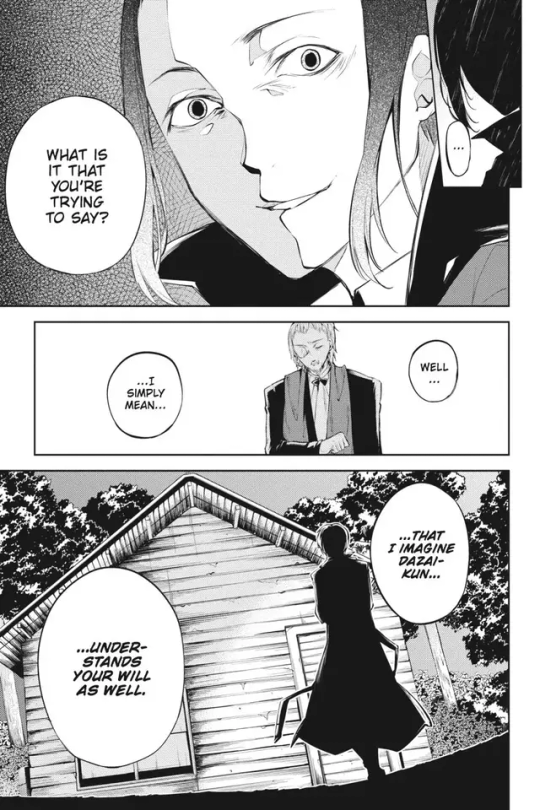
First, he wouldn’t have known that it was Oda who held the words that would convince him to leave the mafia and go into the world of light. Dazai will never come back to his own volition. Second, as those panels quite literally tell you, Dazai was never planning on killing him. He saw his place in the mafia and saw that he was needed there. When Mori finally realizes his mistake with Dazai 4 years later during the Guild Arc, he can’t go back. His plan was still perfectly sound and he still got what he wanted out of it. He shouldn’t regret it, but…
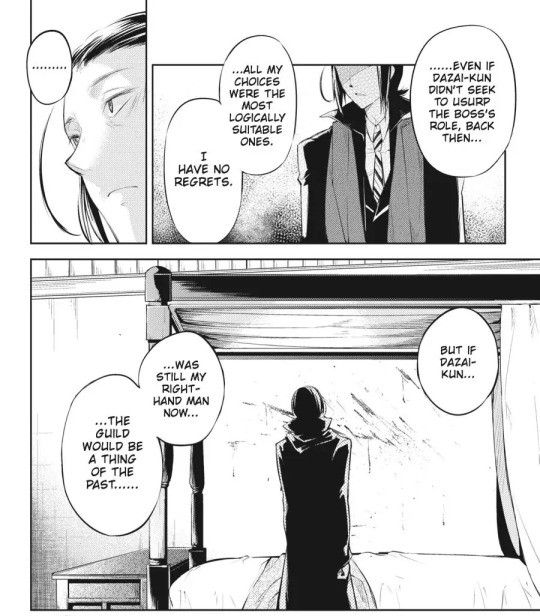
Now that’s been paved out, where does wanting to save Dazai fit into this? If I had to assume, it’s the same reason he didn’t shoot Dazai for leaving his office during Dark Era. He cared about that boy, for 4 whole years he left him and his seat alone when the logical thing he should be doing was replacing him, but as much as he might’ve cared, he needed to put the mafia first. He didn’t let him die because of his use, but also because of their so-called “common destiny” in his eyes, a diamond in a rough he might’ve disposed of otherwise if he didn’t see his potential. There’s not much he could’ve done for Dazai here except keep him healthy and alive. Mori gets tons of flack for not trying to help him, but there's nothing he could've done, not in their position.
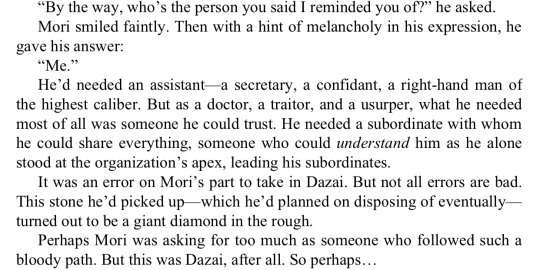
He can't cultivate his potential if there is abuse involved because there is no logical reason for him to do anything to Dazai. You guys have to stop assuming the worst when it comes to Mori, you’re missing huge character details that are right in front of you. The difference between Mori, the Boss of the Port Mafia, and Mori, the Orphanage Director is that he had time to rekindle his humanity so he’s able to care about him like a normal human being, feel guilt, and admit regret after Beast Dazai has died. Mori at most was responsible for ingraining tactical strategies and theories and molding him into the perfect Mafioso and right-hand man.
Not to say any of those aren’t a bad thing. He’s still a child and having him use his desensitized, intelligent mind to build the potential in what he could do for the mafia, it’s just that he’s responsible for very little in Dazai’s personality. The only answer I could give about Dazai being abused by Mori or being abused under the credentials that he’s a child in a violent, unsafe place is the same answer given earlier for Chuuya: in his case, not really.
Regarding this, I retract my statement about anything I’ve said about Beast Atsushi not being a victim in his time in the mafia, but I still hold my stance that he’s not the victim of the port mafia. I want to say the same thing about Beast Dazai and Atsushi that I do here, but considering he picked him up and trained him like how he trained Akutagawa, there’s a great chance Dazai emotionally abused him when you read their interactions. Not physically as that would make him too much like the headmaster, but just enough emotional distress in bringing up traumatic moments to manipulate him into doing what he needs of him.
It’s not a good relationship, but Mori wasn’t targeting Dazai in any real way like the Director and Atsushi or Dazai and Akutagawa. Unlike every other section, I have to conclude that he didn’t do anything to Dazai in that regard other than treating him like another adult when he shouldn't have. I don’t have much to say negatively about their dynamic otherwise. Just a weird, terrible son with his weird, terrible father. It’s more like someone who's taking after their mentor’s teaching and methods rather than an abuse victim echoing their abuser. This is why I don't accept the “Cycle of Abuse” as how the fandom understands it. It tells me a lot that people resort to the blame game.
I wonder what Dazai and Mori’s relationship would've looked like without any of this in the middle. Maybe something in cadence with Ranpo and Fukuzawa, but I can't help thinking that accepting Atsushi as his son in Beast instead of a student wasn't just for Atsushi’s sake. He was about to call him his student too, but immediately changed his mind. He already admitted he was helping him because of what happened to Dazai, so it can’t be a huge jump to think that in the same way this is Atsushi’s redo in building a relationship with a father figure, this is Mori’s redo to give him some atonement for the boy he failed.
A Mother’s Love
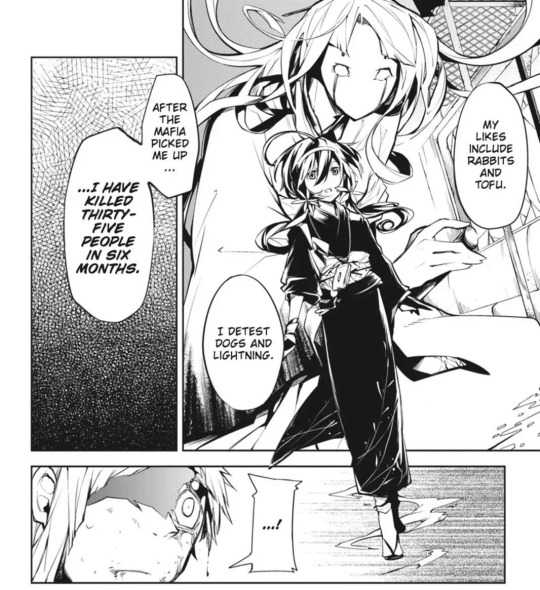
Kyouka, when we first meet her, appears as a force to be reckoned with. With skills a young girl shouldn’t have, and a demon shadowing behind, she’s a terrifying opponent. Quickly though, that appearance falls short in tragedy when the bomb Atsushi’s after is found on her own body and when he asks if she truly wants to kill... She has no answer, but her actions speak clearly. She gives him the defuser because she doesn’t want any more people to die, but the man behind the phone will not let it defuse.
So Kyouka does the next best thing to save more from dying: falling off the train with the bomb that’s about to go off. As long as she dies with it, nobody can use her and her abilities to massacre the people on the train when the bomb eventually fails to do what is necessary. Because that’s when Atsushi realizes that she cannot control her ability herself. No matter what she genuinely wants, she will never have the ability to obtain it because of this one fact. She can only be what people tell her she is.
We all know this story well, she gets saved by Atsushi and the man behind the phone is Akutagawa. Atsushi offers her the same kindness Dazai extended to him regardless of his reputation and destruction because it’d only be the right thing to do. He knows her incoming fate of eventual death for her crimes, he can’t do much, but she should at least experience normalcy this one time.
When she’s about to turn herself in, Akutagawa stops her and tells her she did her job well as a decoy for him to capture Atsushi. I don’t know if you’ve noticed, but there’s a peculiar oddness about Akutagawa here in his attitude towards Kyouka. In all logic, even though she is a strong tool to the mafia, she’s a low-level member, a disobedient one at that, and should’ve been killed on sight for her betrayal considering how quick he is to violence, but he talks as if nothing even happened. He brushes off any thought of her dying as she’s spouting nonsense and that she’s going to go back to the mafia as normal.
But then he spouts off about how she’s better off dead on the ship if she stops killing. What’s up with that? It’s not completely obvious at first, but he’s projecting his own experiences in the slums and beliefs formed from Dazai’s mentoring onto her. From his time when he wasn’t in the mafia, he tells her there’s nothing left out there for people like them, there’s only rock bottom. He can confidently say that there is nowhere that would accept her for her ability, demon snow, because it’s the same for him.
The only way her life can have value is to kill to be useful, just like any good mafia member. It’s exactly why that flashback with Dazai happens here. He’s the one who fed him these thoughts he’s lived with for these past 6 years, and what she’s been believing for 6 months. He doesn’t loathe her, he sees it as doing a favor for her. What else can a little girl who can kill be use of except to kill in her circumstances?
Contrary to popular belief, he is not her abuser and is not the same thing Dazai was to him. He neither trained her nor did we have information on their relationship to come to that conclusion. The only thing we know is that he was the one sent to pick her up by the Port Mafia. We can prove she is not the way she is because Akutagawa since Beast, well, exists. She is one of the few characters I can confidently say was a victim of the Port Mafia itself and not just a person of the Port Mafia specifically.
Akutagawa was trying to be what Dazai was to him, but he is selling a bastardized version of it to her. The person who was her Dazai was Atsushi, the same person who was given Dazai’s act of kindness. Someone who has experienced the same things Akutagawa has and is living proof that she can hope for something better.
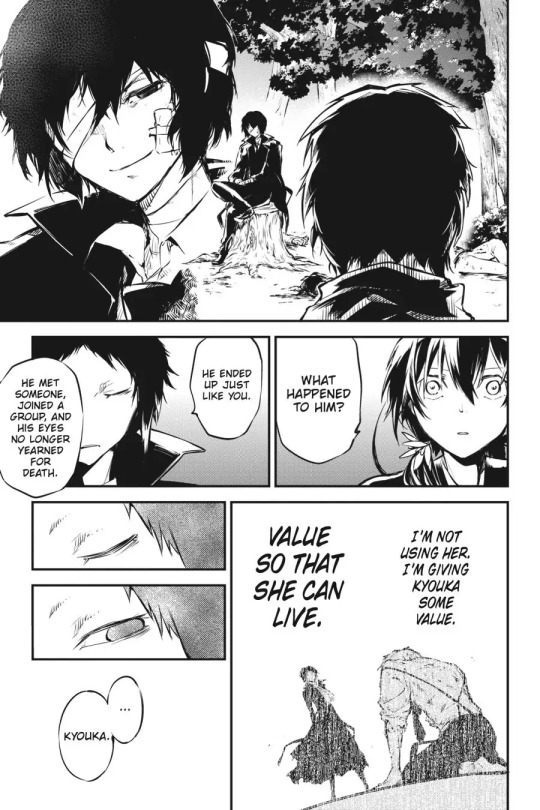
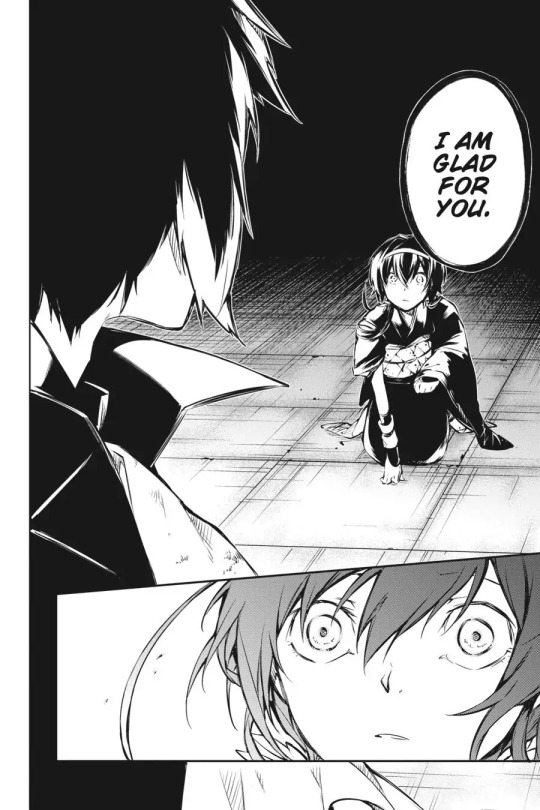
He could see that the same revenge and lack of regard for her life in her eye was the same kind he met Dazai with. Despite that, these lessons he’s internalized have helped no one, not even himself. She can’t find meaning in something that is the root cause of her suicidal ideation. This life is unfulfilling for people like them who need meaning in life. Akutagawa doesn't realize this because he still has Dazai to be his motivational goal. That’s why he failed to help Kyouka, Dazai’s efforts would’ve been considered an utmost failure too if he wasn’t actively trying to fix that misunderstanding. Kindness is what actively saves us and helps us grow, the harm in abusive environments will only stunt us. But what happens when kindness is offered to us, but nothing comes out of it except proving us right that we’re unsavable? Then you have Kouyou.
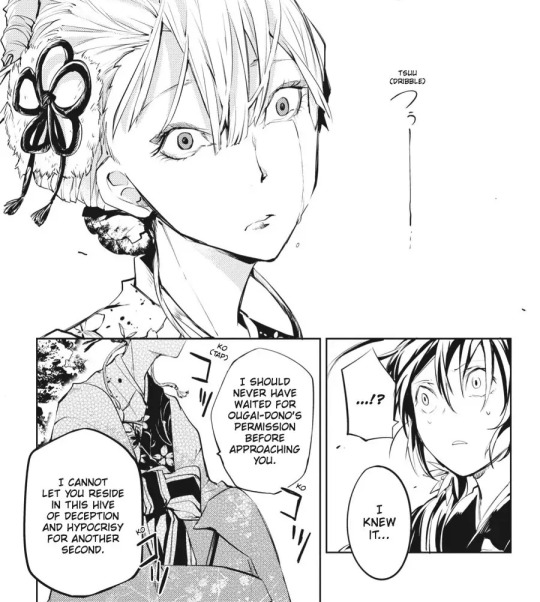
Kouyou is the second person I could say was a victim of the Port Mafia. She has the same belief Akutagawa had about people like them being unable to be saved, so the only thing they can do is embrace it. I can’t claim she was Kyouka’s abuser either as we again don’t know enough, but that doesn’t change that her behavior is emotionally abusive, and is a much better contender than he is.
She’s doing the same thing Akutagawa was doing himself. Seeing themselves in this child and doing what she “needs” instead of what she wants. Just like him, she views this as saving her from the hands of light that will never make room for them and will ignore everything else she says. When Akutagawa is faced with her “disillusionment”, he… accepts it when she refuses his will and chooses another path, but almost kills her to spare her from that decision that would “doom” her.
Kouyou is much less accepting, opting to kill the root source of this hope itself, Atsushi, because her fondness for Kyouka prevents her from leaving her for dead. In contrast to Akutagawa’s attempt at being what gives her life meaning, Kouyou wants to stop Atsushi from being like the same man who also gave her hope that they could escape to the world of light. She can’t bear to see Kyouka go through the same realization she did far too late.
I can see what you're thinking, why am I reluctant to call either of them Kyouka’s abuser? Even if Akutagawa doesn't count, shouldn't Kouyou count because she seems to have an actual relationship with her and her effects are prevalent in Beast, the same points I mentioned to debunk accusations against him? Sure actually, but think about it like this. What the Port Mafia does have in common with real situations is that this is a community that is full of victims who refuse to process their traumatic experiences for any reason, and bring down others to their level when they don’t fit in their narrative to justify what’s happened to them.
There isn’t just one abuser weighing over you, there's this collective pressure from so many who aren't your abuser but they still contribute to your abuse with their presence itself. If Dazai wasn’t there in the mafia, would Akutagawa's situation have changed? Yes. Now if Akutagawa or Kouyou weren’t in the mafia, would Kyouka's situation have changed? Not at all. She’d have fewer examples to refer to, but she’d still be abused. If it’s easier to imagine, think of it similarly to cult mentality and how they keep you in cults. That is the reason I emphasized being a victim of the Port Mafia instead of an individual. Kouyou, Q, and Kyouka, while you can pin their main perpetrators on certain people, their overall situation doesn't change.
Now why doesn’t she just use the phone herself instead of letting people call Demon Snow for her? Wouldn’t she have more agency that way? Atsushi proposes this, but she rejects it instantly. It’s a very simple answer, it’s the same reason she can’t bear to look at it outside of when she’s forced to use it in combat. It’s her ability that killed her parents and why she was forced into this position.
It’s not hard for a little girl to believe she’s nothing more than a killing machine when she sees that night her ability would mercilessly kill her parents. She eventually caves when Kouyou points out how quick she is to vindicate violence to protect that hope she desperately wants a part of, and how she will never change. Her first mission with the Armed Detective Agency is proof in itself. Was Atsushi going to keep extending his kindness after hearing what she could only blame herself for?
Kouyou is a character I’ve seen that gets a lot of double standards compared to all of the other characters I’ve mentioned with abusive tendencies and is almost purely liked. She’s not seen as an absolute monster (The director, Mori) or controversial with one side containing pure dislike and another pure love (Akutagawa, Dazai), it’s only that she’s a well-written, sympathetic badass girl boss. It’s either because she’s a woman, that she doesn’t use an overt intimidation style, that her motives are more obvious in their emotional influences, or all of the above that she’s not treated the same.
Kouyou’s motivations are not special, as I’ve said. The only thing that differentiates them from the others is that they’re not covered by a mask of indifference. As fond as she is for her, she’s not much different from anyone else who holds the mafia up in high regard. She weaponizes her words in where they’d hurt the most so Kyouka would come with her. The entire last section of their battle sums up with her saying, “Kyouka come with me, they’ll only use you for your Ability when they get a hold of it. Even if the mafia did the same thing, at least they’ll accept you for who you truly are: a natural-born killer. You don’t have to fight anymore, I’ll protect you.”
When Atsushi finds Kyouka once again subsequently in her disappearance, she chooses to embrace her violence to help the Armed Detective Agency in this fight with the Guild. After her walk in where she used to reside, she comes the the conclusion she no longer belongs there. Against Kouyou’s wishes, she will brandish her blade for a home. That blows up in her face the moment she starts. Atsushi gets taken, and it’s just as Kouyou said would happen. If even her violence doesn’t get her wish, then what can she do besides leave herself to her fate?
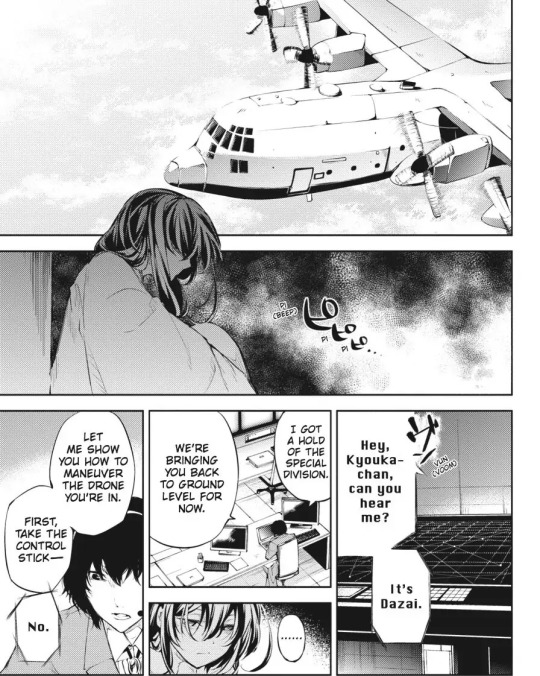
As someone who’s seen another with a talent for killing walk the path of good and is on that same path himself, Dazai talks to her. He tells her about how she hasn’t gone through her entrance exam yet, how she isn’t an official member because she hasn’t proven her will or life on the line to help people she doesn’t necessarily know. Kyouka doesn’t believe she could’ve passed if that’s what it takes, but Dazai doesn’t agree with the points she’s brought up. So what if she’s killed or considered dangerous? That doesn’t make her less qualified to be a part of the Detective Agency, everyone there is from different backgrounds.
She can’t know everything, not even about herself. Nobody does, but it takes others to see more of yourself. Excelling in one area doesn’t prevent you from nurturing your potential in another. What would that make someone like Atsushi, a person who’s been her guiding figure throughout—but was never seen as anything more than a threat or a beast because of his ability before he joined them? The truth is, our lives aren’t defined by one purpose the moment we’re born, it’s only something you can make for yourself. We’re not the places we’ve been raised in, not the ideas people apply to us, and we’re especially not defined by the traumatic experiences we had no control over.
All of it accumulates the person we are today, and we can’t change that no matter how much we resent parts of our image that don’t hold up to what society deems as right, but it shouldn’t take control over what we want for ourselves. It isn’t fair for the victims who were forced into a life where they had to fend for themselves, the children who had to navigate an adult’s messed up world that didn’t have room for them to grow as kids should. Forced into a box where they stay unaware that they’ve ever left their mother’s womb, break out in fury with eyes that grew up too early—only to become lost and thrown away, or rot in that box without a single person knowing they were a breathing, living human being.
I deem abuse selfish for this very reason. Kouyou is wrong for this very reason. If she finds comfort in her reasoning, then I can’t critique her for her own choices and will have to respect her for choosing to stay in the mafia even when the old boss is dead, every abuse victim is different, but not a single person is born evil or good, in the dark or light. Not a soul has to stay in one place because they started there. It’s going to be a hard journey to truly achieve what you long for, results aren’t immediate and not everyone gets there no matter their effort, but still try. Try because it’s still worth trying, because you’re still worth more than you think.
In parallel, you can only get there as long as you’re seeking it. Too many see the Armed Detective Agency as something that will automatically save characters just by working there, but the only way it can help them is if they seek out their help themselves. The ADA is not the right place for every character, but Kyouka does want a place there. After her conversation with Dazai, she knows what she wants to do now. She will smash the drone she’s in into Moby Dick so nobody will have to die, but sacrifice her own life in the process. She’s chained to this place, but her choices aren’t.
She doesn’t have to die with regret, with this she can pass the entrance exam and become an agency member like she wanted. She made a difference for herself just by this act. It’d be a pretty melancholy arc if it ended like that, thank god we know it doesn’t end like this. When you become a full agency member, you gain more control over your ability, meaning—
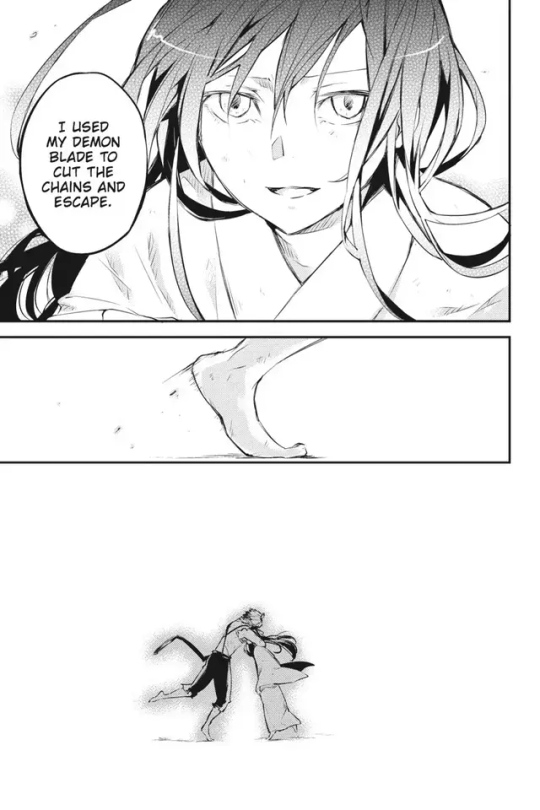
She’s fine.
The exposition is over, let’s talk about Kyouka. Her arc is beautiful and the neglect to talk about her when it comes to her abuse story besides saying, “She’s the one who stopped the abuse cycle” and then nothing else is heartbreakingly superficial. She didn’t stop it, it’s impossible to, but she did break out of it. Kyouka’s section has more exposition than the others but I expected that. I wanted to save her for last because she’s the only one whose arc has come to a peaceful conclusion and not unfinished, and the lighter message felt nice to leave off on.
I shouldn’t berate Kouyou too much, the only reason she stayed in that room after being captured by the ADA is because she did want Kyouka to experience what she never had, and speaking with Dazai helped reassure her that Kyouka would be able to achieve her dreams. It’s no longer the age of the old boss. As well as her shedding the truth about her parent’s death so she wouldn’t have to resent her ability as not an avatar of massacre, but a product of her parents’ love that will always stay with her. She didn’t let go of the phone she’s had this entire time because her mother told her not to let it go.
Me going over Kouyou in this fashion is not me saying you shouldn’t love her character, I like her too. It’s just that it’s passed over so fast what she did, but somehow Akutagawa is more at fault here is mind-boggling. I’d get it a little more if this is because she redeemed herself by wanting the best for Kyouka over what was best for the mafia, but I doubt that’s the case when that moment is talked about so little as well.
I genuinely need you all to understand that not every character is going to have a satisfying, clean conclusion like this. Akutagawa’s story is most likely not going to have a conclusion that satisfies everyone and you should respect it when it comes. There’s no perfect way of writing abuse, but there’s no correct way of doing it either. I don’t think Dazai is going to have the repercussions you want him to have any time soon. If you got the message from Beast, getting revenge on an abuser doesn’t make us feel better or let us process what happened to us. Total resentment keeps us stuck.
The only thing that will heal us is the kindness so many offer in this series. You in no way need to extend that kindness to an abuser, you don’t need to forgive them or let them into your life again, but be kind to yourself and don’t let resentment prevent you from focusing on yourself. Forgiveness and reconnection are not the same thing. Don’t be angry when a victim does want those things. Unless it’s character inconsistent, that’s not something we shouldn’t have any opinion on as the right or wrong way to go about their lives. What if later they do change their mind and want something different from what they originally planned? That’s fine too. Everyone is different. Don’t give unsolicited advice to people who do not want it, let them decide for themselves. It is the best thing you can do.
The worst abusers are the ones who refuse to change and see wrong in what they’re doing, but what about the ones who do want that? Then also let them heal. They did something awful, why isn’t it a good thing they want to stop it now? You don’t have to let them in just because they changed though. Apologies don’t fix the damage already done, but to some victims, it feels nice to feel that what’s been done to them is acknowledged. You don’t want them to hurt others the way they’ve done to you, and neither do they. It hurts to let them forgive themselves when you haven’t and never will, you want to see them suffer, but that’s the only way things can change.
Dazai has changed, is he a good person even after what he’s done? I despise this question for any character of this series. He’s grown so much, and if you don’t think so, reread his conversation with Kyouka I beg of you. It is a far cry from his mindset in the mafia. A better person for sure, but a good person is hard to define for anyone in this series. The mafia is still the mafia, do any of them qualify as good people? The government, even if it’s the position of the right in society, is still an unjust system.
What a good person is cannot be an objective answer, people think there is but it’s not. A good person is how much we know about them and where our position in life affects our viewpoint. Prejudice values don’t make you correct in what you think a good person is, being convicted of a crime, one you might not even have committed, doesn’t automatically make you a bad person, being associated with a group doesn’t mean anything about who you are, etc. It’s all subjective in the end.
Meaning someone like Odasaku is essential in a story like this. He still has a presence in this narrative, even if he died in a light novel, because his existence pushes the boundaries of a “good person” in the fact his contradictory existence establishes itself. He failed in walking the path he wanted, but he doesn’t regret it even in his dying moments trying to.
Afterthoughts
The themes of morality and humanity go hand in hand with the abuse present in Bungou Stray Dogs, so it was hard avoiding talking about this when it was necessary. I don’t think it’s right of us to judge a character’s path that isn’t finished, in a story that’s nowhere near done. Ultimately, I’m only talking in a place of experience but never will it make me exempt from any personal bias. I tried to be as objective and nuanced as I could about this, and I hope it shows.
Abuse isn’t one of those things that I can analyze from any logical stand point or take resources to back my statements up about abuse. Of course everything I say can be backed up, but abuse is a personal, human matter and we’re just human being trying to figure out more than we can handle. I just couldn’t be comfortable with how people are now choosing to talk about Asagiri and needed to shed some light in what you’re missing.
Now I could’ve gone over Higuchi or Lucy because their stories also involve abuse, but I don’t think I could say anything new about them without repeating points I’ve already said. We know very little about Higuchi and what made her so devoted to Akutagawa, and Lucy is pretty quick to summarize considering her story is just like Atsushi’s. Q is also a character to be brought up but I don’t have enough information on them to say much about any abuse itself that happened.
Yosano was also an option but I don’t think anyone had any trouble understanding her backstory. Well I was only really aiming to speak about what’s not been spoken enough. Thank you for reading haha, god this thing is monstrous. Already got to 14k words by the time I was officially done…. I didn’t know if I wanted to lean into character analysis or just exposition, I hope it’s a good enough mix of both. This took way longer than the 4 days I was planning to write this in.
I was later reminded that I could do a post on how their abilities functioned and reflect on their abuse/traumatic events, but I didn’t think I’d have enough room for that here. It could be a bonus post eventually? I don’t think I did Kyouka enough justice in that aspect, but i’d just be beating myself up again about not making this perfect.
I hope I don’t come off scary or a very serious person? I’m very open to requests or discussions people want to engage in. Oh jeez, I’ll just embarrass myself if I keep talking. Writing this was a bit much, never really liked writing stuff myself. Sorry if glossed over anything, I wanted to stay on topic and not detail into something unnecessary.
The message BSD has is a pretty normal one, but there’s something very special about how it’s written here and I’m happy it exists. Maybe I shouldn’t have made this so long? But there’s so much to express sigh……
#bsd#bsd spoilers#bsd manga#bsd meta#bsd analysis#bungou stray dogs#bungo stray dogs#atsushi nakajima#dazai osamu#meta#analysis#akutagawa ryuunosuke#kyouka izumi#mori ougai#bsd beast#beast atsushi#ozaki kouyou#chuuya nakahara#SIGHHH I NEED A NAP#THIS WAS TOO MUCH EFFORT FOR ME
253 notes
·
View notes
Text
Dina Fox from Superstore is 100% autistic
I’ve watched Superstore maybe 20 times, 5 times consecutively, and I’ve come to notice something with my favourite character in the series — she’s definitely autistic. (general spoiler warning for for Superstore of course)
Just a disclaimer that, obviously, I’m not a psych major or some kind of professional, I’m just using my own experiences and knowledge plus observations of others. Also this is just for fun, I like this show and I love the character so I wanted to do this!
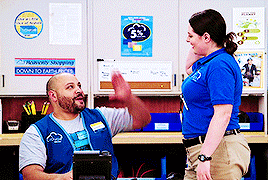
Starting with I think the most obvious sign is her “by the books” attitude and her strong sense of justice/rigid morals. Dina LOVES rules and organization and we can see that in many episodes across the whole show. Her uniform is always in tiptop shape with her signature company approved hairstyle, her ability to properly recite the employee hand book, her unwillingness to change the time sheet for Garret after he forgot to clock in because “rules are rules”.
As a side note, she’s very good at using said rules to her advantage, super good at finding loopholes while still maintaining her sense of justice and strict morals. In S2E3 “Back To Work” Dina uses the rules to essentially blackmail Jeff and prevent Amy from being reported and potentially fired while still being by the book! In S5E6 after the union cards go missing, before she looks for the cards in order to now be breaking the rules she says “according to company rules I must report any and all union activity to my manager so, \turns to Amy there’s been union activity” and then proceeds to break into the new DM’s car to find the union cards while Amy distracts her.
This need for rules seems to connect to one of her special interests: Security! Dina LOVES security and knows a lot about it. She’s knows all the emergency codes and protocols and is always trying to catch crime in action. She knows why people shoplift and what is done with those shoplifted items, she’s head of security for a reason!
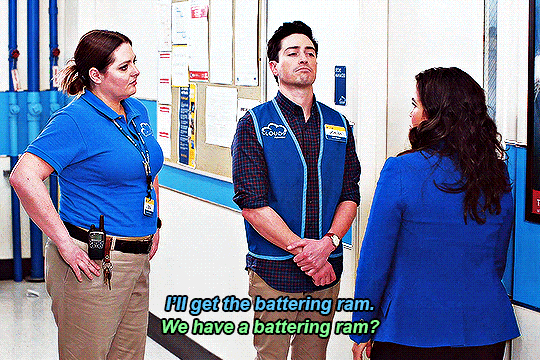
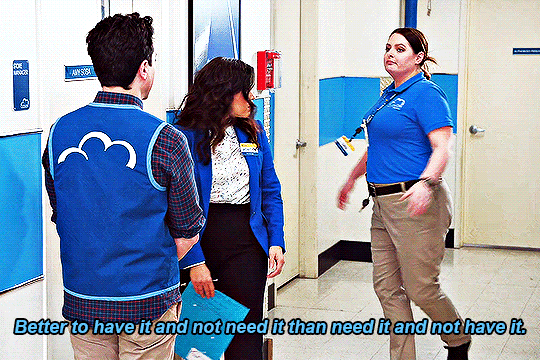
Small mention to her special interest in birds. She loves (well, loved) her birds and is vegan because of her love of animals which I find to be a cute trait!
Moving on, she is… very very brutally honest and doesn’t hide her feelings from anyone. She’s very open about how she feels about a situation or about how you look, pointing out your worst physical features or insecurities without hesitation. She’s open about how she thinks her sister is ugly, about Glenn’s weak chin and high voice, about Garret’s weak chin, Amy’s left boob and joints, about her dislike but respect for Sandra, and many other quotable and equally funny examples
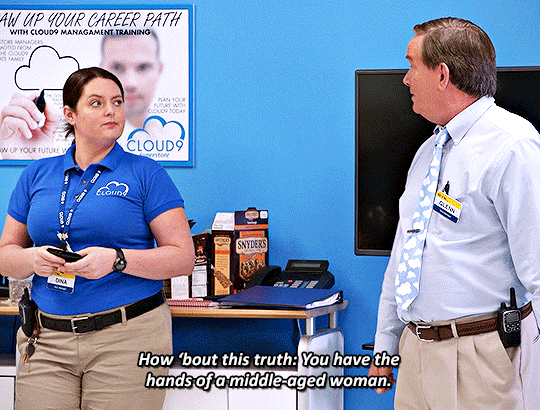
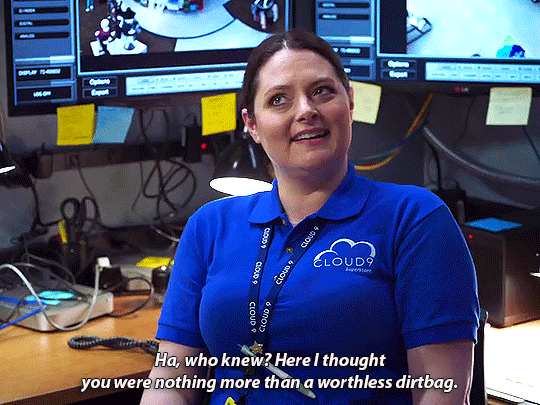
She’s very detailed-oriented. In both instances of her being a bride’s maid she is always prepared for anything and everything. She has a dollar amount on how much she would be paid for her to have sex with every employee in the store. She has a detailed list of enemies and best friends and she has every employee ranked by attractiveness.
She’s not the best at social cues! Sure she’s not completely unknowing but misses a lot. That whole one-sided crush in S1 with Jonah where she thought they were flirting. S2E22 “Tornado” Where Garret was trying to drop hints that he wanted her to care about him but she was oblivious to that fact. She’s also unable to lie, or at least lie well. In S5E21 “California Pt.1” She tries and fails to keep Jonah off Amy’s trail while she’s at the interview for corporate and in turn makes him even more suspicious of both of them and in S6E9 “Conspiracy” she very badly lies about being able to say “Have a heavenly day” again to Glenn.
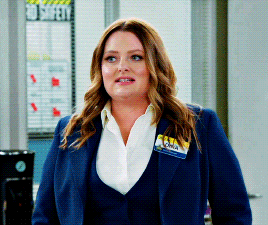
Here’s some more points in a random order because I was never good at writing essays (plus there’s like 6 seasons with an average of 20 episodes each, I'm not going to actively look through all that just for Dina moments)
She’s not really empathetic? I think it’s more just a misunderstanding of social cues or strict morals but she has a perceived lack of empathy towards others
She’s got pretty literal thinking
She likes strict regimens and the only evidence I have for this is that she likes listening to the same songs
She’s awkward in conversations and doesn’t realize
She has a loud voice! I know she has an unusually large diaphragm but I also like to think this has to do with her being autistic and unable to tell when she’s being too loud
--
(for any screen reader users, i use two kaomojis at the end. sorry if anything gets messed)
idk if anyone has said this before but i wanted to share this because... i just wanted to...
again just to rehash this is just a head canon. im not the creator or writers of the show and im not some autism expert, i just love this show and character
sorry if anything was hard to follow im not the best at writing essays, they were my least favourite thing in school and idk why. theyre just very hard to do ૮ ․ ․ ྀིა
thank you for reading! feel free to comment anything i missed or anything i could improve on! i love and appreciate friendly feedback and outside opinions! ദ്ദി(˵ •̀ ᴗ - ˵ ) ✧
#superstore#sitcoms#tv shows#nbc superstore#dina fox#dina fox superstore#autism#actuallyautistic#actually neurodiverse#neurodivergent#neurodiversity#tv show#character analysis#lauren ash#superstore nbc
22 notes
·
View notes
Text
Multiverse Library: Mumbo, Scar and Grian.
The trio:
As Fluff, Hurt/comfort and Angst respectively they are commonly put together as the main tone gods while Martyn (Humour) and Oli (Crack) are kept more in the backround.
Can work alone and often do but excel when together to make angst with a happy ending.
Unlike other multiverse library deities they don't have distinct library sections are their domains are much bigger.
The most powerful when working on character driven universes but have to work extra for more worldbuilding based stories.
All have a dark form when working on darker universes, doesn't change their personality, just their form.
Mumbo, deity of Fluff and chain of hearts.
Sceptre cointains pure uncontaminated love and color depends on the type... Sometimes it cracks and when that happens bad stuff soon follows.
Smells of sugar and spice cause he's everything nice.
Actually doesn't really like pink or cream but when he gets a new outfit it starts to fade into pastels so he has just given up changing it.
Cape is actually a waterfall of Steven Universe style pink healing water.
In his Dark Fluff form usually works on possessive/obsessive fluff which is where the chain of hearts title comes from.
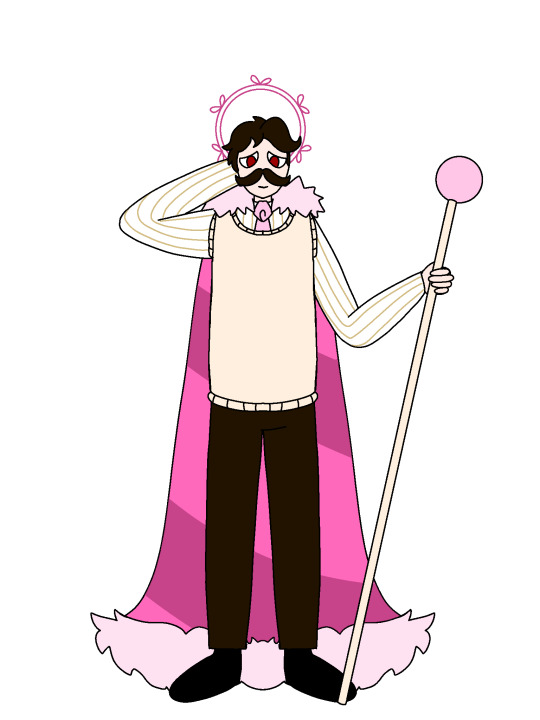
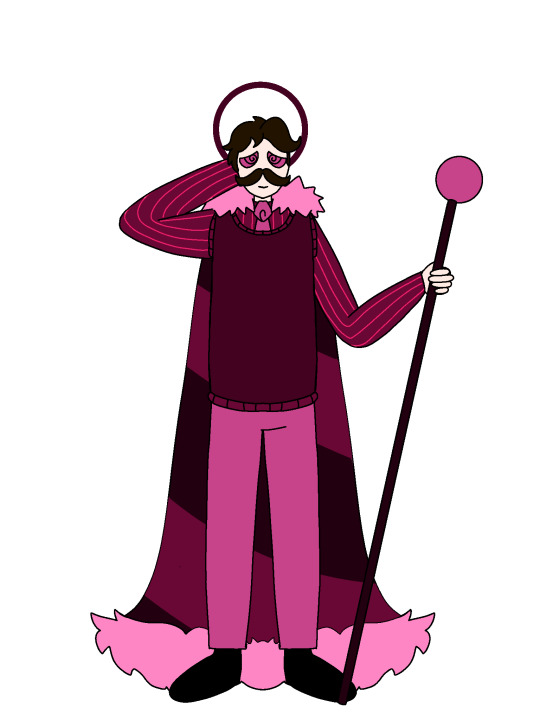
Grian, deity of Angst and Sadist Watcher.
Ever seen your blorbo put trough the horrors? Perhaps tortured either mentally or phisically? That's him!
Behind the incredible amount of Grian angst.
Cloak doesn't do anything, Grian just thinks it looks cool and mysterious. Cloak is also made of nightmares so it is not a good idea for a mortal to touch him.
He and Oli share one thing and that is a love of misunderstandings and mistakes born from lack of knowledge.
Fan of Tragic characters who'se downfall is their faul but also tragic characters who couldn't have done anything to prevent it...just likes tragic characters I guess.
Average Fanfiction writer if they were a god with control over multiple universes.
Doesn't change too much in his dark form, just increases the severity of his domain. He watches without helping, that's where his secondary title comes from.
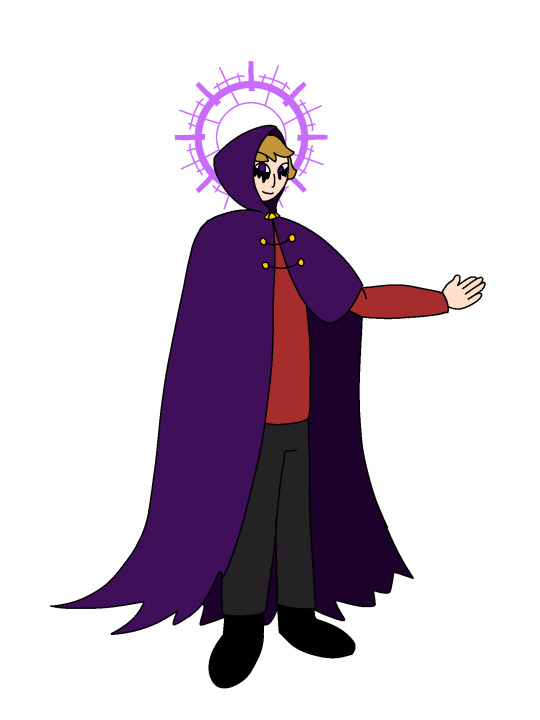
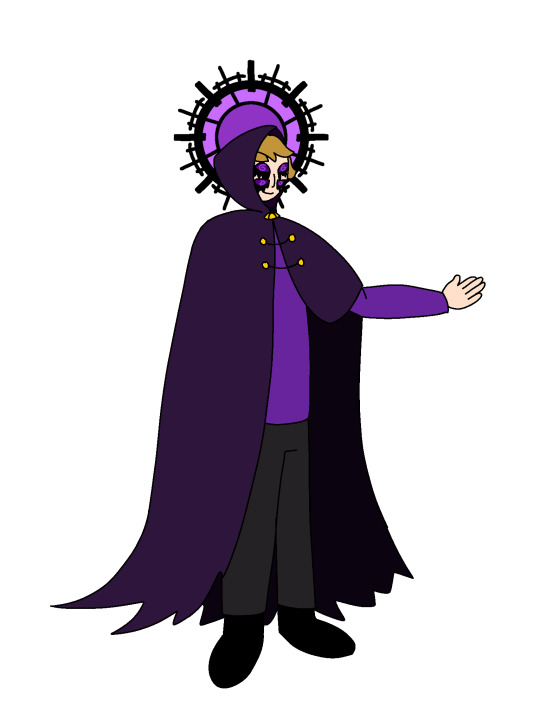
Scar, deity of Hurt/Confort and Toxic Rose.
The oldest and arguably the most powerful of the three as the embodyiment of a much more vast domain. Also the goofiest of the three.
Mood shifts aren't uncommon and neither are long periods of either high energy or low energy.
After Secret Life happened in the main timeline he adopted his mortal counterpart's outfit and has stuck with it since.
When working with Oli often ends up creating "crack treated seriously" types of universes.
In his darker form often works with unhealthy relationships of all kind which is why he's also called the toxic rose.
Is brothers with cub (who will be introduced at a later date).
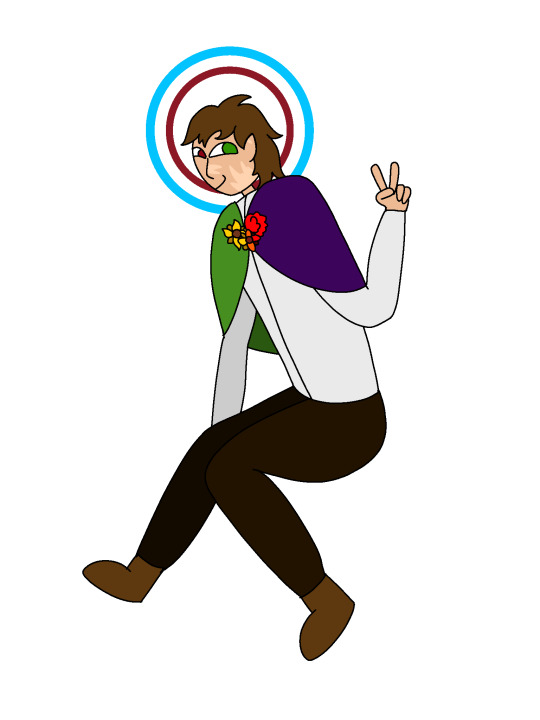
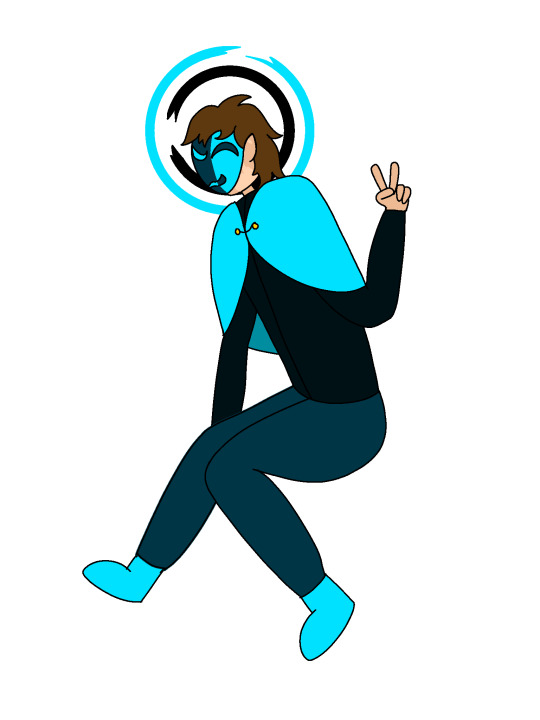
#trafficblr#traffic smp#hermitcraft#grian#hermitblr#mumbo jumbo#goodtimeswithscar#multiverse library
25 notes
·
View notes
Text
edit: i’ve had a few people respond saying that if i’m not part of the religion (as i changed my religion to be a hellenic polytheist after being raised in a jewish and catholic household) to not get the menorah and instead to focus on things such as recipes and cultural practices instead of the directly religious ones - thank you for the feedback. i’m leaving the rest of the post as it is so people can see where i was coming from regarding my family and hopefully give feedback on what kinds of things i can do instead - i will still be with my family for the first 6 nights with the menorah i grew up with and have celebrated with every year, but i appreciate the feedback about whether or not to get my own
originally i had asked about getting a menorah for my own apartment since im moving out and will be spending the last two nights of hanukkah away from my family and had asked about getting one. as mentioned above, i have been advised not to get one and have taken out the request for places to get one from this post. here is the context for my family’s history with the religion and how i was raised.
i wanted one because my dad’s jewish family is really the only family i have - my mom’s catholic family are either all dead or horrible people who we don’t talk to, and while my own religion isn’t judaism (im a hellenic polytheist) i would feel really really uncomfortable not celebrating holidays i grew up with. i don’t have a local synagogue to go to (something my jewish friends in the city i live also struggle with) and the rest of my family is in germany and were first in the holocaust and then east germany so even my great grandparents (who are still alive, 90 years old and fucking killing it) have never been able to go to an actual synagogue so my family as a whole is mostly about trying to keep the religion alive in smalls ways and personal adherence to values and tradition because community just hasn’t been something we’ve been able to truly be a part of and i really really don’t want to lose that part of me just because i’m moving out :( also to add on from the original text: my family cares a lot about being jewish. it’s very important to them and they raised me to value it myself. even without being able to go to a synagogue to worship alongside others, my family takes the religion quite seriously when trying to work with what they can, such as keeping my great grandfathers Sefer torah in the family when people have tried to take it to display it in a museum as a “this survived the holocaust!” display (yes that’s genuinely something that happened)
any advice on what to avoid and what to continue to practice when i move out is appreciated. i unfortunately don’t have a great line of where the religious aspects end and the cultural aspects start since my knowledge of everything comes from being raised by my jewish family while lacking a community around me that could teach me a broader context of religion vs culture (and having been raised in a very catholic and protestant christian area where people barely even know what hanukkah is, not even a bullshit comment of it being “jewish christmas” or what other misunderstandings go around this time of year)
#hanukkah#- r#that’s how i’m tagging hanukkah and we’re gonna leave it at that#i’m not tagging all the million and one ways people spell it okay?#i don’t have time for that
13 notes
·
View notes
Text
Sooo... I guess my AU is getting more fleshed out than I expected b/c now I'm gonna consider incorporating P3/P4 Arena/Ultimax elements into it! Namely the Shadow Ops and some of the lore. Buckle up guys! Also I can't thank @dancingpurge enough for giving me insights whenever I have questions since my knowledge on P3 is slim and very rusty admittedly!
So... Here's what I was thinking:
Jayce starts to grow worried when he notices that Viktor's health gets bad when he uses his Arcane abilities too much. Especially when he slowly stops resting in-between.
Part of the reason for lack of rest is primarily being him secretly exploring Maruki's Palace after first encountering it and his powers were his best form of defense. Even before that though, he has slowly started getting excessive with it (especially upon discovering that he CAN use it in the real world and not just limited to the Metaverse like they initially thought).
While Viktor gets more invested in Cognitive Psience (especially after he starts regularly meeting Maruki), Jayce starts to dive into more about the Metaverse and any other forms of research involving it in a bid to find a way to help him.
This rabbit hole leads to him discovering info about the Kirijo Group and rumors about human experimentation along with the Dark Hour. As horrified as he feels about that, he thinks the current head (Mitsuru) is his best lead to maybe helping Viktor.
He was able to arrange a meeting after some hurdles (basically proving that he's trustworthy enough). He explains his situation, already prepared to be called crazy but she was thankfully able to somewhat understand. She also does confirm the rumors after a couple more meetings with bit of hesitation and making it clear that it's the greatest shame within her family name. But she's slowly taking things in a better direction and even acts as a leader of the Shadow Ops.
They then make an exchange: Jayce gives her the notes he secretly took regarding Viktor's powers so that she can commission a dampener to be made so that Vik can better control his abilities without the risk of death while she hands him some of the research she was able to find so that he can better understand things a bit even though the setting of P3 is much different from P5.
She does warn him about one thing: With what he has told her, there's a possibility that if further used too much then Vik's powers could actually make his own Persona go berserk and out of control. While it won't kill him, it WILL accelerate the deterioration of his life partially b/c of his past frail health.
That being said, she offers both of them a spot in the Shadow Ops. Complete with accommodations such as a better home and pay. The downside being they'd have to move away if they accepted. She allows Jayce time to think about it and talk to Viktor since she can see potential in both of them and can even help Viktor better hone his abilities.
Part of the later conflicts is Viktor misunderstanding things and his old feelings of resentment, insecurities, and even abandonment start to resurface as a result (Maruki's machinations was not helping either). Kind of a deconstruction of their dynamic which I have read some occasional small analysis on how it can border on co-dependent and Viktor still having immature tendencies (at least compared to Jayce which again, is something I've observed a bit after looking back at some scenes).
The thing is that Jayce wanted to talk to him about it but ended up getting too caught up with everything to find the right moment to do so. Especially with Shido later looming over them which then culminates into a raid into their home and getting attacked when they walk in after that televised calling card. Viktor, of course, was also very stubborn too.
This conflict was also kinda inspired by a question I saw on my Twitter TL once that's best summarized as: Would Viktor (if fully) be forgiving of Jayce should they survive and just be teleported somewhere? Which was a very interesting question to me because on one hand, probably. Just wouldn't be willing to forgive himself for a while if anything. BUT on the other hand, I feel like he probably would bottle up a lot of negative feelings when you think about what things were like in his perspective. He wouldn't HATE Jayce but I can imagine some resentment for a while too so why not a mix of both in the case of this AU? His general conflict is his inner negative feelings regarding Jayce despite loving and caring about him still along with his unwillingness to forgive himself for what he did as the Herald.
They do accept Mitsuru's offer after resolving things and are much happier after joining. Basically tying into 3rd Semester's main themes regarding healing and moving on with your life and starting over.
Not sure about having Evokers involved or not since I vaguely remember reading an old fic where there was a moment where Joker uses one and gains a different Persona though not in a good state of mind. I'm not sure for certain how using an Evoker could effect someone who already awakened in P5's setting and method.
I guess if they are then Jayce finds one in the case Mitsuru gave him. Probably for him to study and maybe take apart for a closer look. Viktor unfortunately ends up finding it the night before his own boss fight ("Herald of Eden") and takes it while Jayce was sleeping along with the notes on how it's used... You do the math on what he would try to do out of desperation if that makes sense. Like I said, I'm not sure about including the Evokers yet so that could be scrapped.
Although, the Evoker idea does sound like an interesting deep dive admittedly as that could be the final nail on the coffin to Viktor losing full control of himself and his Persona as he could only handle so much.
That's about it so far! I'm on a roll guys! 😄
#starchild rambles#new life new rebellion au#nlnr au#persona 5#p5#persona 5 royal#p5r#p5r spoilers#persona 3#p3#p4au#p4 arena#persona 4 arena ultimax#crossover au#jayce league of legends#jayce talis#arcane jayce#jayvik#jayce x viktor#viktor#viktor league of legends#viktor arcane#viktor the machine herald#mitsuru kirijo#also imagine these two being somewhat intimidated by Mitsuru a bit and it just sounds so funny!#i want to try and do this in a way where it's understandable from both of their ends
9 notes
·
View notes
Text
Let’s talk about what humans do versus what the Gods can do so as to make a point about what humans are doing that have nothing to do with the Divine. Especially in regards to people claiming to be speaking and acting on behalf of the Divine.
(TW: s*x abuse, ch*ld abuse, spiritual abuse, manipulation)
How do these people make themselves known? Well, it’s easy. There are predators out there who use fear and manipulation tactics to groom and take advantage of their lack of knowledge about a Deity’s existence.
This is why education about discernment and spiritual psychosis needs to go hand in hand with mystical information. For too long the resources we have do not handle these types of things and would sooner conflate the actions of a human with the actions of a Deity. We must hold ourselves responsible for these things pervading the community but it’s impossible with the resources that we have now.
The victim will likely never see the difference because that’s how trauma works - it is impairing of judgment and other nervous system responses that would further assist in determining a communication from the Gods. Trauma dims out what could be the Gods’ communication and replaces it with the trauma. The Gods are not perfect and even if you think They should stop every situation from happening in Their name, They cannot because access to Them has been erased by the pedophiles, narcissists and other awful people who would sooner place themselves in the position of the Deity in order to provoke, disturb, and take advantage of others.
This happens the most, it seems, with Loki. Which, if you actually do know Loki, He would likely never be the provocateur of abuse but based on His controversy, tends to be the scapegoat for it due to misinformation, misunderstanding due to the aforementioned people.
I am not saying the Gods are perfect by any means (They are pretty awful Themselves) but They are more often than not shrouded in peoples’ perceptions by this awful continuous issue in our community and we need to start talking about why this happens instead of running the other direction. We need to allow the Gods to present Themselves rather than relying on other humans for it to work which means we need more education in regards to mysticism and discernment rather than assuming everything people do is invalid.
A properly trained person who has been given the appropriate tools to be able to facilitate and transmit direct communication from the Divine are never going to be abusing anyone unless they would like to have their ass handed to them by the Deity they claim to speak for.
We have a problem with narcissism in this religion. We are a religion full of people who are marginalized, have been deemed unlovable and broken by society, and are searching for meaning in a society devoid of meaningful relationships, community, and is running rampant with narcissists preying on people left and right.
I myself have ran into my fair share of people who have been groomed by others and manipulated and abused by people who claim to know better in regards to what the Deity wants from them. I have also been manipulated myself by people who claim to know better than me.
We cannot allow these people to take away the sanctity of Divine communication, the blessing, necessity, and support of community, and places that should allow others to heal in a place where there should be healing rather than destroyed or impaired even further by hateful people. It is not impossible but it takes work where most people are too afraid to venture.
I don’t know what it could look like but the reason I do this work and the reason that any person who is working in partnership with the Divine should be interested in - healing.
If there is anything I do know, the people who have committed these acts will get what comes to them.
#deity work#paganblr#norse paganism#mysticism#norse gods#norse polytheism#deity worship#lokean#pagan blog#devotional polytheism
24 notes
·
View notes
Note
Hey there, BABY ARMY! As someone who's been around since 2016, I've seen BTS and the fandom evolve in fascinating ways. Let me tell you about a period that really tested our strength – the Taekook roller coaster of 2019.
Back in the day, things were simpler. Sure, 2017 saw a bit of a "separation" from Bighit, with limited content beyond a single selca. But there were enough crumbs – dispatches, award show interactions, playful moments – to keep shippers satisfied.
Then came 2019. Now, this year was a doozy for a Taekook shipper like me. It felt like everything had changed. Gone were the candid behind-the-scenes interactions, replaced by a carefully curated public image. Interactions seemed superficial, almost choreographed. It was like Big Hit was desperate to rewrite the narrative. Remember the iconic Anpanman and DNA interactions? Gone. Replaced with a calculated push for another pairing. Dispatch, once notorious for dropping Taekook bombshells, started focusing on other pairings. Even their "I Love You" sign, a secret handshake of sorts, became a group thing
This strategy felt manipulative. It made me question everything. Were the boys still close? Was it all just a performance? The worst part? The awkwardness seeped into their on-stage interactions. Even Jungkook, usually so carefree, seemed hesitant around Taehyung.
Bighit, it seemed, was playing a clever game. They'd sprinkle in a few, heavily edited Taekook moments (diff anon have mentioned previously) while simultaneously hyping up another pairing. That's why in the eyes of general fandom those moments are nothing in front of other ship content. And no matter how we explain of taekook bond of that time it will always lack in their eyes. It felt like they were trying to downplay their bond, portraying them as just bandmates rather than close friends. This aggressive strategy took a toll, especially on Taehyung. The free spirit we knew seemed subdued. Their once-exclusive moments were now public knowledge, and they were forced to fabricate stories on camera.
My saving grace? Those rare moments when the facade crumbled. Taehyung's subtle eye contact at award shows, the way their bodies moved in sync, the now-legendary Vlive moment (May 2019) – these were testaments to their unbreakable bond.
Even with the restrictions, they tried to be close at concerts. This was further complicated by Jungkook's awkwardness – a sign even the general ARMY noticed. This is where Taehyung's infamous "Weverse imagination" comment comes in, but that's a story for another day.
A Turning Point:
Now, let's rewind a bit. Remember the disbandment rumors around 2017? Interestingly, 2018 saw a surge of previously unseen tk content in the form of Bangtan Bombs. My theory? Two things were at play: disbandment fears (with Taekook's relationship potentially a factor) and their contract renewal in May 2018. These cut scenes were a way to pacify the the members, especially Taekook.
However, things took a sharp turn after the renewal. Bighit's "ship-flopping" became more aggressive, butchering Taekook moments and shifting focus away from the hyung line. As RM himself admitted, without the pandemic, they might have disbanded again.
The Aftermath:
The #taekookisoverParty trend marked a shift. Taehyung started responding in English to avoid misinterpretations, and interactions resurfaced. This begs the question – if there was a genuine separation in 2019, how do we explain hotel room shares, the natural flow of their interactions now, and even their hug at the GDA 2020?
The forced public separation feels like a fabricated narrative. The whole SOOP conversation felt like a way for Bighit to avoid taking blame. Protecting the artists? Valid. But twisting the narrative to the point of misunderstanding artists, that's where I draw the line.
This turned from a "suspicious moment" to a rant, I apologize! But as someone who lived through this period, it stings to see new ARMYs offer neutral perspectives without acknowledging past events. It's crucial to understand history before forming opinions. Don't settle for a neutral perspective. Learn from the past. This scenario isn't just about a ship, it's about the power dynamics between artists, agencies, and the fandom caught in the middle. Remember, sometimes, the most captivating stories are the ones that lie beneath the surface. Also, this is just one interpretation amidst a sea of ARMYs. But hopefully, it sheds some light on the intricate web of emotions and narratives surrounding these two precious members.
I'm sorry for the text wall but m not usually an active user. Have been reading old blogs from a few days and saw a same perspective. I also saw one of your anon asking about taekook bond 2019-20. To the anon, here you go.
Thank you for this context! 💜
But as someone who lived through this period, it stings to see new ARMYs offer neutral perspectives without acknowledging past events.
Forgive me if I've misinterpreted this but is this directed at me? I try to stay in my lane as best I can. I've received criticism for having a decisive opinion as baby army too so maybe I do err on the side of trying to give a neutral read? I don't know.
Essentially, I'm aware of all the stuff you mentioned here but don't have the context of watching it real time. Apologies if my opinion ever reflects that in a way that upsets you.
Thank you again for context. It's really good to read it this way. 💜
8 notes
·
View notes
Text
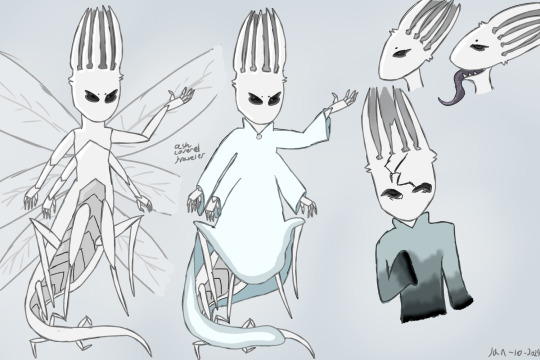
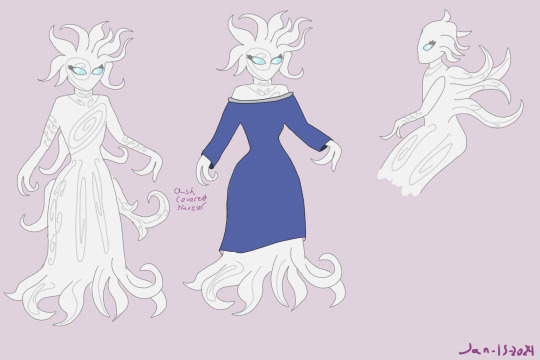
My AU and fic designs for Pale King and White Lady (Along with backstory under the cut)
Let us start off with the White Lady. While she doesn't remember it, but has some recollection and knowledge of it, she started off as some sort of fluffy seed. A seed that can float in the wind and go far and wide. She landed in a canyon near a stream where she grew.
The canyon didn't get any sort of sun but that didn't matter to the White Lady as her species wasn't made to absorb the sun. She is pale and lacks chlorophyll. However, she needed a lot more nutrients in the ground, and even though there was a stream and soil it was only enough for her to grow enough to realize that she couldn't stay in that spot forever, so she unrooted herself and made the argus journey to somewhere safe.
Luckily for her, she metabolized way slower, that's why she's thick. But she moved so slowly. She came across some pockets of life, but it wasn't sustainable for her and left before she used up all of the nutrients so the pockets could recover for others. By the time she reached maturity, she made it to the Howling Cliffs. She made it to livable lands that could sustain her and others.
She was able to make her way to a pocket of greenery, but there was one issue. She was going to another god's lands. She would be stronger than Unn but she was so weak from her travels that she would be no match for the slug. She dredged her way to the very south of Unns land and tried to gain her strength there.
Many bugs didn't give her kindness in the area. She was in Unns land, and everyone there was worshipers of Unn. There would be no reason for another god to be on their god's land. She kept herself isolated as she slowly gained strength. His roots grew throughout and felt the land around her.
Eventually her roots picked up something strange on the other side of this livable land. She only saw paths of this creature created among her journey here and she knew it was a Wyrm. Out of curiosity she unroots herself and goes to the edge of the land.
The Pale King was born in the wastelands with his litter. He was raised by his father along with his siblings while the mother went off to find more mates, as there is a sex ratio of 1:10 making more males than females. Some one needs to train and take care of the young so that wyrms could actually live.
Once they were old enough to travel far, they left the nest and went on to see the wastes together. One day after a hunting session with his father, they came across a tiny kingdom. His father taught him that lesser and smaller bugs would only be useful to put in their thralls if there was a massive amount of them for them to accomplish massive tasks which the wyrms could find useful. However since they came across a small kingdom that isn't enough to eat or to put under their thrall, so they left.
This even sparked PK's interest in lesser insects. Not bugs that he could eat or make into slaves, but bugs that can be his servant and do things he is unable to do.
Once all of the siblings reached maturity, PK went the complete opposite direction of any wyrm trail and away from everything. He wanted to see more bugs, more kingdoms. Maybe even make his Kingdom?
He wandered and saw many livable lands, but they were either too small or didn't have what he was looking for. He eventually came across a steep cliff side. The sun rarely shined here and it occasionally snowed. But on the opposite side of the cliff he could feel life. He could feel potential.
He then started crafting his new body within him. He knew that it would be nearly impossible to rule with a body like his, so he needed to downsize. He wandered around the edge of the land. He was losing energy, trying to make a body for himself, so he was weak. Suddenly he was ensnared in pale roots.
The WL and PK's introduction was a misunderstanding. WL thought that PK was slowing himself down to put her guard down so he could attack her. PK explained his situation and story and he ensnared WL with his words. He knew that he would be extremely weak once he was reborn, so he begged for the WL to take care of him.
She did and then this was a start of an alliance, which turns into friendship then a partnership.
#oh god tumbler don't decrease the quality of the image#i worked hard on at least one of those drawings#you can probably tell which one#hollow knight#hollow knight au#split family au#hollow knight fanart#hollow knight pale king#hollow knight pk#hk pk#hollow knight white lady#hk white lady#world building
18 notes
·
View notes
Text
So there were a lot of details I missed after rewatching Tales of the Foundation. But they still fit perfectly with my suspicion on how the scp foundation interacts with ordinary people or would civilian populations be more accurate?
Now I could be completely wrong about things which is fine. Those can stay fanfics. Kinda doubt we are going to get any new content but I can still have my fun speculating. It's going to be two years soon of no new animations and the original YouTube channel has said they are working on a different project.
Okay let's start with Agent Lawrence. Now I know electrician is more than dealing with electrical equipment in the scp universe because of the wiki explaining the foundation has a more supernatural power source. But the way Lawrence mentioned used to being an electrician seems more of an ordinary electrician job. Like when he got the power back on it during scp 106 wasn't based on use of supernatural elements. So the idea of this guy just getting dragged into the foundation after witnessing stuff that definitely doesn't belong in normal electrical equipment is my favorite theory. The MFT career might have been due to his reaction to a supernatural threat that usually most people would have died from.
I completely forgot that Dr. Collingwood had outright said she had a PHD in Experimental Research of Cryptids. Sorry about that. So she probably either took a chance on a shady college that later led her to the scp foundation or most likely is part of the population in the scp foundation universe that has prior knowledge. Still cool and I wonder if that has lead to to misunderstanding in the past with other coworkers. It also could explain the different reactions between the meeting photo between Dr Collingwood and Dr Buck. Personally after rewatching I think she probably knew stuff that families who outright have a culture from working mainly with people in the scp foundation itself.
Now about Dr Buck, odds are most likely prior knowledge since her father worked in the foundation. But I have a pet theory with the idea that she may not have outright know about what the foundation was at first. This secrecy with her father having a job that is not on any known legitimate agency could have contributed significantly to family difficulties. Since the politics even in a scp universe would have their own political scares with governments both knowing and not knowing everything with this organization that might as well be its own country/government that operates by hiding itself from the general public. This lack of transparency between her parents could have contributed significantly to the arguments that was depicted in a flashback. Her mother would definitely would want explanations especially since there could be psychological tolls that working with a secretive job that cant be declassified and/or actual unexplained close calls that could have been dangerous to her and her family thanks to the father's secretive job. Their constant fighting could have led to Dr Buck trying to be more independent of her parents with her own goals earlier on. One of the things the scp 3887 preyed upon was Dr Buck's childhood fears and her fear of being insignificant. Regardless of if Dr Buck knew of the foundation, she could have been a workaholic that focused a lot on achieving goals but neglects socializing outside of work. I still like the idea that Dr. Buck had veterinarian experience and later a marine biology degree that got her either acquired by the foundation or was simply a job that looked good on paper that turned out to be the same company her father could never give answers for. Especially since anomalies can be come in a lot of varieties. I still think that some sort of undersea anomaly is what led to her initial hiring. She later got answers to lot of questions later on about her family's secret job.
Agent Carson I'm speculating was raised knowing and wanting to be part of the Mobile Task Force in the past. Much like how some kids want to be soldiers. His disillusionment when talking to Agent Ramsey about being disposable as the D class makes me wonder if he puts a lot of faith in his gear more than other people. As for why Carson doesn't have a former civilian vibe, he does complain and compare things within conversations. He seems like the type of guy to accidently over share some of his past.
5 notes
·
View notes
Text
Top 5 Accounting Challenges for Startups and How to Overcome Them
Introduction
Business is very similar to getting on a fast roller coaster, exciting yet full of unexpected bends. An accounting problem is among the definite yet ignored by most startups. The people who start the company are usually multitasking, and they undertake the financial work with no expert knowledge. This approach may bring unanticipated severe consequences.
Here at Accelero Corporation, we've managed to support many new companies and small businesses in systematizing their financial activities and meeting regulatory requirements, especially when they have to comply with international tax such as bolded keywords.
Today, we will discuss the five most prominent problems in the accounting area of newly formed businesses, and I will share some tips on how you can defeat them easily.
1. Mixing Personal and Business Finances
There is no doubt that mixing personal and business finances is a mistake that a large majority of entrepreneurs make, despite being aware of the dangers associated with it. Even if it's something you are not aware of or it seems innocent to you in the beginning, it may cause major problems later during the tax season, especially if you try to raise money or get your finances audited.
How to fix it: Get a separate bank account for your business and open it the day you start. Try very hard to use accounting software for bookkeeping that not only ensures the separation of expenses but also gives you a very clear understanding through a very regular but not cluttered flow of information.
2. Poor Cash Flow Management
The smooth flow of cash is the survival blood of a new business. Even if your company is financially profitable, the negative cash flow can have such implications as inability to pay bills on time, lost business opportunities, and even closing up shop.
How to fix it: Utilize forecasting resources to foresee future cash flow requirements. Make certain that you send out invoices to your customers promptly and record your payables and receivables accurately. Look into professional services, such as those provided by Accelero Corporation, as an option to keep everything under control.
3. Complex Tax Requirements
The taxation process can get quite scary for some people, especially when it is related to new businesses that have shareholders or customers in a foreign country. In a case where you are managing your business from India and arranging deals with U.S. clients, the tax process may become more challenging than you expect, and this is something you need to be prepared for.
It doesn't matter if you owe federal income tax, or GST, or are eligible to get tax refunds; not doing your job on time in another country can be very expensive for your startup. It is not just the fines that you will be charged with, but your business may be in the red or might even have to close as a result of the mistakes you made.
How to fix it: You should visit tax professionals in advance and ask for their advice. For instance, in cases when the business is carried out by people who are mainly from out of India, such as NRIs, green card holders, or ex-pats, Accelero Corporation's accounting for USA Tax Filer in India Green Card Holders, a service for NRIs, Green Card Holders, and ex-pats, will be a great help to enable the busy entrepreneur to be free from the task. Also, the entrepreneur is 100% law-abiding.
The word in bold is well looked after by their staff so that there are no issues of my creation or misunderstandings from any of the involved parties.
4. Lack of Accounting Knowledge
Many entrepreneurs are not experts in accounting, and that’s completely fine. However, the lack of understanding of the fundamentals of bookkeeping, tax, and financial reporting is what can put you in an unpleasant situation because you might not see the important things clearly when the time for decision-making comes.
How to fix it: Upskill yourself. Study the basics or pay an accounting expert. When you give the right people, such as Accelero Corporation, your accounting work, you can have time to develop and grow your business and have your books well-maintained at the same time.
5. Failing to Plan for Growth
During the initial phase, numerous start-ups exclusively devoted their time to staying afloat. However, the scenario can significantly change when your business experiences rapid growth from ‘small time’ to ‘big time’ in one go. After that transformation, your elementary accounting system might become obsolete. Now you require payroll, inventory management, and financial projections, and maybe you also have to deal with foreign income and tax treaties.
How to fix it: Make sure your accounting systems are fit not only for now but also for the future. Use cloud-based tools and software that can be easily changed in line with the growth of your business. Also, have a look at the long run and be a part of a company that is not only familiar with the Indian tax laws but also the American ones, mainly because with the brand making plans to go international, you will need this.
Final Thoughts
Being an entrepreneur is tough enough already, so don’t spend your precious time doing accounting. Once you figure out the problems and solve them in time, you are not just following the law, but also literally creating your way of expanding.
No matter if you are just a small company in your local area or a person from the United States who is currently managing his or her company with a base in India, Accelero Corporation brings you personalized tax and accounting services, which enable the startup to be financially healthy and prepare it for an audit. The know-how of the keywords highlighted in the text also means the completion of the income tax operation is beneficiary, thus, you can use your resources more effectively, developing your business.
0 notes
Text
Editorial: What Steve Witkoff doesn’t get about Ukraine (and Russia)

In any negotiation, one of the most powerful weapons is knowledge. In that regard, Steve Witkoff is willfully disarmed.
And it’s playing just right for Russia.
The interview that Witkoff, Trump’s special envoy, gave to Tucker Carlson a few days ago revealed a truth that was perceived especially bitterly here in Ukraine:
In the negotiation where everything is at stake, Ukraine’s most powerful ally is represented by a man who either knows next to nothing about Ukraine or woefully misunderstands it. Moreover, the resulting vacuum is being filled with the propaganda that Russians feed to him.
Observing it from Kyiv, knowing that Witkoff is among the people deciding Ukraine’s future, was sobering and terrifying.
Although Witkoff, Donald Trump’s special envoy to the Middle East, wasn’t yet officially appointed to lead the negotiations with Russia, informally he has sidelined the Russia envoy Keith Kellogg. It happened due to his success brokering the ceasefire between Israel and Gaza — which has crumbled. One wonders if his approach to the Middle East deal was as devoid of factual knowledge as his tactic with Russia is.
In the interview, Witkoff revealed two key things. One is his apparent infatuation with Russian President Vladimir Putin. No surprises there, since it appears to be a job requirement for anyone in the current U.S. administration.
Witkoff praised Putin for respecting Trump by ordering a portrait of him drawn by a renowned Russian artist, and for praying for Trump following his assassination attempt.
He and Carlson contrasted it with President Volodymyr Zelensky’s “disrespectful” behavior toward Trump during the infamous Oval Office meeting. “The arrogance of small countries!” Carlson quipped. “The ignorance of small men,” we’d like to say back to him. (Here’s our editorial about that meeting).
But after praising Putin, Witkoff moved on to reveal something even worse: His utter lack of knowledge about Ukraine and the war.
At the center of this conflict, Witkoff said, is the fate of “these so-called four regions.” He made an attempt to list them, only to fail embarrassingly.
“Donbas, Crimea…” he started.
“Luhansk,” Carlson helpfully added.
“Yes, Luhansk!” Witkoff said. “And two others.”
Neither of these two men who have strong opinions on Ukraine and Russia (and in the case of Witkoff — the power to dictate their futures) even know the names of the embattled regions of Ukraine that Russia has pronounced theirs.
Here’s a primer for Witkoff and Carlson. The four regions they were trying to recall are: Donetsk Oblast, Luhansk Oblast, Zaporizhizhia Oblast, and Kherson Oblast. “Oblast” is a region. Like a state, but with less autonomy.
These regions have suffered the bulk of Russian aggression, they have bled and lost countless lives and cities. The least they deserve is for people to remember their names.
All four regions are partly occupied by Russia, but in two of them — Kherson and Zaporizhzhia — Ukraine controls the regional capitals. Donbas is an unofficial name of the region that encompasses both Luhansk and Donetsk oblasts. Crimea, which Witkoff tried to put in the same line-up, is a separate entity, a fifth region. It was illegally annexed by Russia in 2014. The annexation wasn’t recognized by the international community.
However, the name confusion wasn’t the most concerning issue in the special envoy’s interview.
At the next turn, Witkoff said that the regions were “Russian-speaking” and “there have been referendums where the overwhelming majority of the people have indicated that they want to be under Russian rule.”
This is a dangerous lie.
These statements aim to show that the partially occupied regions belong with Russia anyway — and therefore, should be just given to Russia, no big deal.
They are among the most frequent arguments Russia and its agents have been using to justify Russia’s claims on Ukraine — but hearing them from a person with direct influence on the fate of the war is new, and worrying.
And what’s the reality? It’s true that many people in Ukraine, especially in its eastern and southern areas, speak Russian as their first language. They are not ethnic Russians. They are Ukrainians who speak Russian as the consequence of long years of eradication of the Ukrainian language, first by the Russian Empire, then by the Soviet Union, and its replacement with Russian. Still, they didn’t entirely succeed, and even in the most affected regions, people often speak a mix of two languages. The share of Ukrainian speakers has been growing since Russia’s attack in 2014, and more so since the full-scale invasion in 2022, as people choose to switch to Ukrainian.
Importantly, for Russian-speaking Ukrainians the language isn’t a marker of political affiliation or allegiance. To put it simply, Ukrainians can speak the Russian language and hate Russia at the same time. There are Russian-speaking Ukrainian soldiers fighting against Russia in the trenches.
Finally, there are Ukrainians working at the Kyiv Independent whose first language was Russian — and they are far less pro-Russian than some special envoys.
The other Russian lie that Witkoff disturbingly signs on to is the supposed “referendums” that the occupied regions held, where “the overwhelming majority of the people have indicated that they want to be under Russian rule.”
There was no such vote. In September 2022, when Ukraine was on the offensive, Russia announced so-called “referendums” in the occupied parts of four Ukrainian regions. It was a farce in which Ukrainians had to vote at gunpoint (here’s an example of it). The Kremlin announced, groundlessly, that 98% of the population “voted” to be a part of Russia, and declared annexation. (Here’s our editorial about it).
The validity of these sham referendums is recognized only by North Korea — and now, apparently, by U.S. special envoy Witkoff.
To contradict the outcome of the “referendum,” when less than two months later the Ukrainian army liberated the city of Kherson, thousands of city residents took to the streets in celebration. Since then, Russia has been attacking Kherson daily, killing civilians in the city they claim is theirs.
As Ukrainian journalists, we are no strangers to correcting the misconceptions about Ukraine, or calling out Russian propaganda. But increasingly so, we are forced to correct misconceptions coming from the people with direct influence on the fate of our country.
Watching Witkoff’s interview from anywhere in the world can be embarrassing. Watching it in Kyiv is also frightening.
For Ukrainians, everything is at stake in this war — and in these negotiations. We already know the U.S. representatives will be rooting for Russia, not Ukraine. But Witkoff’s interview raises the question — can the sharp turn of U.S. foreign policy be rooted in incredible ignorance?
Editorial: A president just disrespected America in the Oval Office. It wasn’t Zelensky
It’s time to say it plainly. America’s leadership has switched sides in the war. The American people have not, and they should speak up. In the past several weeks, the U.S. leadership has demonstrated explicit hostility towards Ukraine and aligned its rhetoric and policy with Russia. The

The Kyiv IndependentThe Kyiv Independent

0 notes
Text
Staff Augmentation vs. Legacy System Challenges — From External Pressures to Personal Stress

When you’re working with legacy systems, change is rarely straightforward. These systems are the backbone of your operations, but they come with a unique set of challenges. Transitioning to something new? That’s where things get complicated—and risky. It’s not just about adopting new technology; it’s about managing the domino effect that these changes unleash across your organization. One issue leads to another, and soon enough, external pressures, team tensions, and personal stress all collide.
Imagine a key team member with deep system knowledge leaves unexpectedly. You’re scrambling to fill the gap, and then a critical feature fails, putting data and operations at risk. Or maybe a system issue surfaces on the Friday before a holiday weekend, stretching resources to their limit. It’s a pattern that’s all too familiar: problems stack up, each one intensifying the next.
This is where staff augmentation becomes more than just hiring extra hands. It’s a strategic move that brings in specialized skills exactly when and where they’re needed. Whether it’s stabilizing data, filling knowledge gaps, or easing team workload, staff augmentation offers a tailored solution to manage each layer of these overlapping challenges. It’s not just a quick fix — it’s a way to regain control, support your team, and navigate complex transitions smoothly.
In this article, we’ll walk through real scenarios that demonstrate how these issues arise together and explore how staff augmentation can help you handle the ripple effects — keeping operations steady, morale high, and stress in check.
When a Key Employee Leaves and Everything Goes Sideways
Legacy systems can feel like mysteries locked inside the heads of a few key people. So, when one of those people leaves unexpectedly, it’s not just a staffing issue—it’s an operational crisis. You’re left with an information void just as new problems crop up, like data loss or a critical feature going down.
Suddenly, it’s not just one challenge; it’s a domino effect where gaps in knowledge, team strain, and technical issues all collide, threatening stability across the board.
Facing the Fallout When They’re Gone
You can feel the impact immediately. Data becomes harder to track, essential features start glitching, and the whole system feels unstable. Without your expert to rely on, you’re left scrambling to keep everything running smoothly, knowing the risk of failure is growing with each passing hour.
Data Risks Multiply: Many legacy systems lack basic safety features like automated backups or version control. Any slip-up with data storage, without the right person to fix it, becomes a major operational risk. Now, without your go-to expert, there’s no easy way to retrieve lost data or secure what remains.
Features Start to Fail: Those custom tweaks and features—ones that only your veteran employee truly understood—begin to act up. Clients notice, deadlines loom, and you’re one step away from a full-blown system outage.
How Staff Augmentation Steps In: By bringing in data recovery and system experts quickly, you can stabilize the situation. Data specialists can jump in to secure or restore critical data, while legacy system experts handle core functions, minimizing disruptions and keeping essential features running.
The Team Left Behind — And the Pressure They’re Under
Without your legacy expert, the remaining team members are stretched thin, suddenly juggling tasks they didn’t sign up for. Everyone is taking on extra responsibilities, and tensions start bubbling up as frustrations rise.
Workloads are out of control. Each team member has a full plate already, but now they’re managing tasks they weren’t trained for. Errors pile up, deadlines slip, and the frustration is almost palpable.
Rising tensions. When people are under pressure, collaboration suffers. The usual flow of teamwork turns choppy as misunderstandings grow, small issues become big conflicts, and the stress starts taking a toll on morale.
Knowledge bottlenecks. With the main expert gone, only a few remaining team members know parts of the legacy system. The result? Workflows get stuck, bottlenecks appear, and even minor questions cause major slowdowns.
How staff augmentation eases the load. A skilled temporary hire can handle the technical tasks, letting your team focus on what they’re good at. Adding short-term training support also fills knowledge gaps faster, easing tension and making sure everyone knows what they need to keep things moving.
The Personal Toll on Each Team Member
It’s not just technical overload; the personal strain is real. Team members are thrown into high-stakes roles, often feeling overwhelmed, unprepared, and isolated in their efforts to hold everything together.
Unfamiliar responsibilities. Faced with complex, unfamiliar tasks, team members start doubting themselves. “Am I even capable of handling this?” becomes a daily question, eroding confidence.
Burnout risks rise. With everyone pushing longer hours and taking on extra work, burnout isn’t far behind. Energy levels drop, productivity dips, and the cycle of stress and fatigue intensifies.
Isolation and pressure. Without the right support, employees feel like they’re on an island, with no one to turn to for guidance. The pressure to perform without slipping becomes overwhelming, especially when they’re uncertain about their new responsibilities.
How staff augmentation supports well-being. Temporary specialists ease the load by covering critical tasks, allowing your team to focus on familiar work and avoid burnout. Plus, having external experts to collaborate with reduces isolation and boosts morale, giving your team the support they need during a tough transition.
Bringing Stability Back
When a key person leaves unexpectedly, and everything feels on the brink, staff augmentation offers more than just a quick fix. It provides essential skills and knowledge when you need it most, restoring order amid chaos. With the right support, your organization can keep data secure, reduce team strain, and rebuild confidence—turning a potential crisis into a manageable transition that strengthens your operations.
Balancing Tech Demands and Team Tensions
When you’re integrating new technology into a legacy system, the pressure is on. There’s a constant need to innovate, to keep up with new demands, but that doesn’t mean everyone is ready for change. Your team faces the push to ideate, prototype, and implement new features while still managing the familiar weight of legacy tasks. But then resistance kicks in—longstanding team members might push back, refusing to share knowledge or even outright resisting the changes.
The Push for New Features, and Why It Feels Like a Losing Battle
The call for new features is loud and clear. Clients want more capabilities, executives expect tech upgrades, and your team feels the pressure to deliver. But that’s easier said than done when the foundation is a decades-old system, and innovation feels like forcing a square peg into a round hole.
External ressures for innovation. Stakeholders expect new features that fit modern needs, like integration with cloud platforms or enhanced data analytics. But the legacy system’s limitations and patchwork updates make even small upgrades feel like major overhauls.
Resource strain on your team. Team members are trying to juggle feature ideation and development while maintaining the legacy system’s stability. That workload—combined with tight deadlines—stretches resources thin and fuels frustration.
How staff augmentation keeps innovation moving. Bringing in experienced product development and technical specialists adds much-needed expertise without overloading your team. These specialists know how to work with legacy systems and can focus on prototyping new features, so your team isn’t pulled in too many directions.
The Resistance Factor: Navigating Interpersonal Tensions
With new technology, the friction isn’t just in the code. Some legacy team members have been running the system for years, and they see change as a threat. They might withhold knowledge, resist learning new tools, or challenge every update, creating a tense atmosphere for the rest of the team.
Knowledge hoarding and pushback. Legacy team members might keep vital information to themselves, creating bottlenecks. Or they might resist updates, adding friction every time the team tries to make progress on a new feature.
Collaboration breakdowns. When some team members are eager to adopt changes and others refuse, it creates an “us versus them” environment. This divide leads to miscommunication, stalled projects, and a breakdown in teamwork.
How staff augmentation eases interpersonal tensions. A third-party specialist can bridge these gaps. By bringing in neutral experts who know legacy systems, staff augmentation provides a buffer, encouraging knowledge-sharing and easing tension. These specialists often bring new perspectives, helping teams work through resistance and fostering a more open, collaborative environment.
The Emotional Strain of Change Fatigue
Everyone on the team feels the push-and-pull of these demands, but some feel it more acutely. For newer team members, adapting to the legacy system can be exhausting, and for long-timers, the constant pressure to learn new tools and adapt can lead to burnout. It’s a cycle of change fatigue, self-doubt, and frustration.
Stress of “proving yourself”. Newer employees might feel they have to prove themselves by adapting to both the legacy and the new systems. Meanwhile, veteran team members feel pressure to “keep up” with tools they aren’t comfortable with.
Risk of burnout and low morale. When deadlines loom and tensions run high, it’s easy for team morale to dip. Employees start to feel isolated, questioning if they’re capable of handling the changes and struggling to find energy for yet another update.
How Staff Augmentation Protects Well-being: Adding external experts takes some of the strain off the team. Temporary specialists handle the technical work of integrating new features, freeing up your team to focus on what they do best. Having that support lightens the load, reducing burnout risk and giving everyone a bit of breathing room.
Strengthening the Team, Even Through Tension
When team dynamics get strained and innovation feels like an uphill battle, staff augmentation can turn things around. By bringing in neutral specialists, you’re bridging gaps, easing tensions, and creating a team that’s ready for change. Staff augmentation isn’t just an extra set of hands—it’s a way to keep the team cohesive, focused, and capable, no matter how tough the transition.
The Holiday-Time Incident and Its Ripple Effect

Picture this: It’s Friday afternoon, right before a long holiday weekend, and just when everyone’s wrapping up, a major issue surfaces in your legacy system. Maybe it’s a critical feature breaking down, a data processing glitch, or an error in an essential workflow. Whatever the problem, the timing couldn’t be worse. With limited staff available over the holiday, you’re facing an uphill battle to keep things stable until the full team returns. This is where everything converges—external pressures, team dynamics, and personal stress combine to create a high-stakes situation.
Facing External Timing Constraints
When issues hit during a holiday, they don’t wait for convenience. Extended downtime threatens stability, making the stakes even higher. With limited in-house support, any delay could mean dissatisfied clients, unmet deadlines, or even compliance risks if the problem lingers too long.
Operational impact of the timing. An incident at this point throws the whole system off balance. Regular workflows get interrupted, service levels drop, and every hour of downtime becomes more costly. Knowing that your skeleton crew will be stretched thin over the weekend only amplifies the risk.
Escalating client and stakeholder expectations. External stakeholders—clients, regulatory bodies, partners—expect stability regardless of timing. They don’t see a holiday; they see a potential lapse in service, and that can lead to strained relationships or financial repercussions.
Solution with staff augmentation. Having an on-call emergency response team through staff augmentation allows you to manage this crisis. These experts are ready to jump in, troubleshoot issues, and maintain operational continuity, even during holidays. With this added layer of support, you avoid extended disruptions, keeping your clients and stakeholders reassured while minimizing damage to your system.
Managing Team Dynamics During a Holiday Crisis

The strain doesn’t just stop at operational impact. Your in-house team is likely to feel the pressure to “hold down the fort” during a time when they’d typically be taking a break. This is more than just an inconvenience; it’s an immediate burden on morale and teamwork.
Interpersonal pressures and burnout risks. Being asked to cover during a holiday, especially on short notice, can lead to resentment and burnout among those who are asked to stay. When people are called to handle more than they’d planned for, tensions rise, leading to strained relationships and, often, mistakes in critical moments.
Struggle with team communication. With part of the team off-duty and others scrambling to keep things running, communication can get chaotic. The team’s usual rhythm is off, and minor misunderstandings turn into time-consuming setbacks.
Solution with Staff Augmentation: By introducing rotating on-call staff from a staff augmentation provider, you reduce the pressure on your permanent team. These professionals fill the gap, covering key responsibilities and ensuring your team isn’t running on fumes. With support in place, your core employees don’t have to shoulder the entire crisis alone, helping keep team morale intact.
The Personal Toll of Unexpected Responsibility
The holiday season is often when people expect to unplug, recharge, and spend time away from work. But when a crisis lands on their plate unexpectedly, those hopes quickly fade. This unplanned responsibility can take a heavy toll on their well-being.
Overwhelming sense of responsibility. Being the go-to person during a holiday crisis means missing out on much-needed rest and relaxation, often with family plans disrupted. The emotional toll is real—employees feel stretched, isolated, and pressured to deliver under tough conditions.
Stress and exhaustion. When employees face a major incident without backup, it quickly leads to burnout. The stress of a high-stakes problem combined with the disappointment of a holiday spent at work can leave them drained, impacting performance long after the issue is resolved.
Solution with staff augmentation. Temporary on-call experts from a staff augmentation service provide critical coverage, letting your permanent staff take time off as planned. By lightening the load, you’re allowing your employees to prioritize their well-being while ensuring continuous support. This kind of backup not only handles immediate issues but preserves your team’s energy and morale, setting them up to return recharged and ready to take on their usual responsibilities.
Keeping Operations — and Morale — Stable
A holiday crisis doesn’t have to lead to chaos. With the right staff augmentation strategy, you can respond to critical issues without sacrificing your team’s well-being or letting downtime stretch on. From emergency troubleshooting to on-call coverage, staff augmentation provides the expertise and support needed to handle crises smoothly, even at the most inconvenient times. It’s about more than just filling in—it’s about ensuring that your team, your system, and your organization stay resilient, even under pressure.
1 note
·
View note
Text
The Ultimate Guide to Hiring a Local Arborist

Trees are vital to our environment, providing shade, beauty, and a habitat for wildlife. However, maintaining them requires specialized knowledge and skills. This is where an arborist, a professional trained in the art and science of planting, caring for, and maintaining trees, becomes essential. Hiring a local arborist can ensure the health and longevity of your trees. This guide will walk you through the key considerations and steps in hiring the best local arborist for your needs.
Understanding the Role of an Arborist
An arborist specializes in the care of individual trees. They are knowledgeable about the needs of trees and are trained and equipped to provide proper care. Services offered by arborists include pruning, tree removal, emergency tree care, planting, and pest management. Proper tree care is an investment that can lead to substantial returns, providing significant aesthetic, economic, and environmental benefits.
Why Hire a Local Arborist?
Expertise and Knowledge
Local arborists are familiar with the specific needs of trees in your area. They understand the local climate, soil conditions, and common pests and diseases that affect trees. This local knowledge allows them to provide more effective and tailored tree care.
Compliance with Local Regulations
Tree care and removal can be subject to local regulations and ordinances. A local arborist will be aware of these rules and can ensure that any work performed is in compliance with local laws, helping you avoid fines and legal issues.
Community Trust
Local arborists rely on their reputation within the community. They are more likely to provide high-quality service to maintain their local standing and secure repeat business. Learn more.
Steps to Hiring a Local Arborist
1. Research and Recommendations
Start by asking for recommendations from friends, family, and neighbors who have used arborist services. Online reviews and local community boards can also be helpful. Compile a list of potential candidates to contact.
2. Verify Credentials
Ensure that the arborist is certified by a reputable organization such as the International Society of Arboriculture (ISA). Certification demonstrates a commitment to ongoing education and adherence to industry standards. Additionally, check if the arborist is insured. This is crucial to protect yourself from liability in case of accidents or damage.
3. Ask for References
A reputable arborist should be able to provide references from past clients. Contact these references to inquire about their experiences, the quality of work performed, and any issues they encountered.
4. Obtain Multiple Quotes
Get quotes from at least three different arborists. This allows you to compare prices and understand the range of services offered. Be wary of extremely low quotes, as they may indicate subpar work or hidden costs.
5. Ask About Services and Equipment
Discuss the specific services you need and ask about the equipment they will use. Ensure that the arborist uses up-to-date and well-maintained equipment, as this can impact the quality and safety of the work.
6. Get a Written Contract
Once you have selected an arborist, ensure that all terms are detailed in a written contract. This should include the scope of work, timeline, cost, and any guarantees or warranties. Having everything in writing helps prevent misunderstandings and provides a reference in case of disputes.
Warning Signs to Avoid
Unlicensed or Uninsured Arborists
Never hire an arborist who cannot provide proof of certification and insurance. This could expose you to significant risk.
Lack of References
If an arborist is unwilling or unable to provide references, this is a red flag. Reputable professionals should have a history of satisfied customers.
High-Pressure Sales Tactics
Be cautious of arborists who pressure you into making immediate decisions. Take your time to make an informed choice.
Conclusion
Hiring a local arborist is an investment in the health and beauty of your trees. By following these steps, you can find a qualified professional who will provide expert care tailored to your local environment. This ensures your trees thrive, enhancing the value and enjoyment of your property for years to come. Remember, the right arborist can make all the difference in maintaining the splendor and safety of your landscape.
Top Chop Tree Service & Land Management 1015 Jay Rd, Cedar Grove, WI 53013 920 838–0520 http://topchoptreeservice.com/
Find Us: https://www.google.com/maps?cid=6675138459137812390
0 notes